2024/25 End of Season Bumper Special
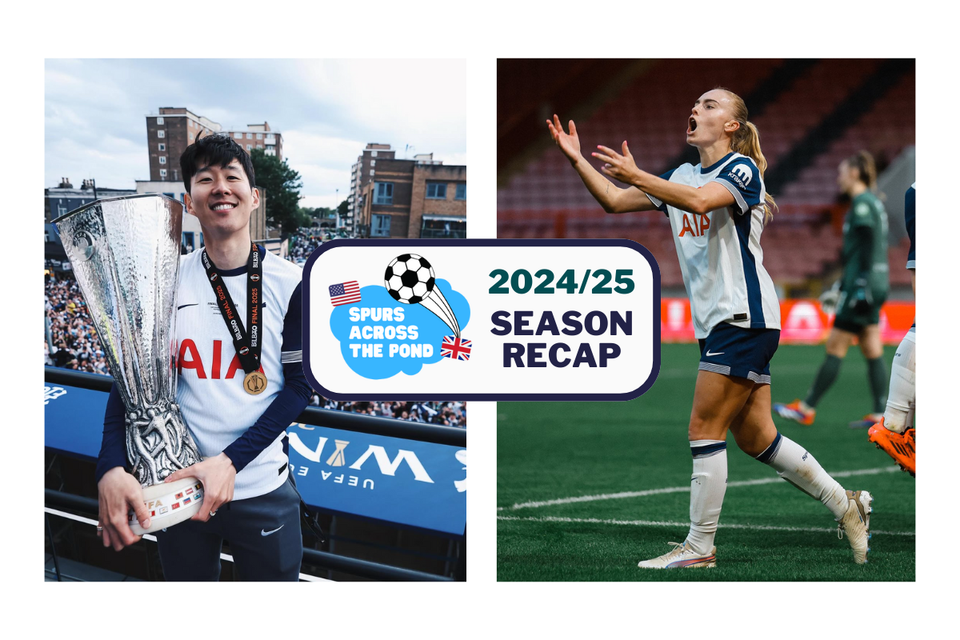
There was a lot going on this season, from a club rebrand to fan drama to an open-top bus parade. If it weren't for the cause of that last one (the Men's team winning the Europa League), we might not want to revisit this season at all; it was certainly more bad than good across the club. But I am nothing if not committed to recording things for posterity, so here we are for the annual end-of-season bumper special, albeit a lot later in the summer than I would usually get around to it.
Per tradition, I'll be recapping the two senior teams' seasons with the usual categories like fun facts, special topics, and player superlatives. This year, I will also include a quick roundup of memories from the Academy teams' seasons, with notable loan player achievements as well.
If you want to refresh your memory on how the club was doing at this time last year, check out my recap of the 2023/24 season.
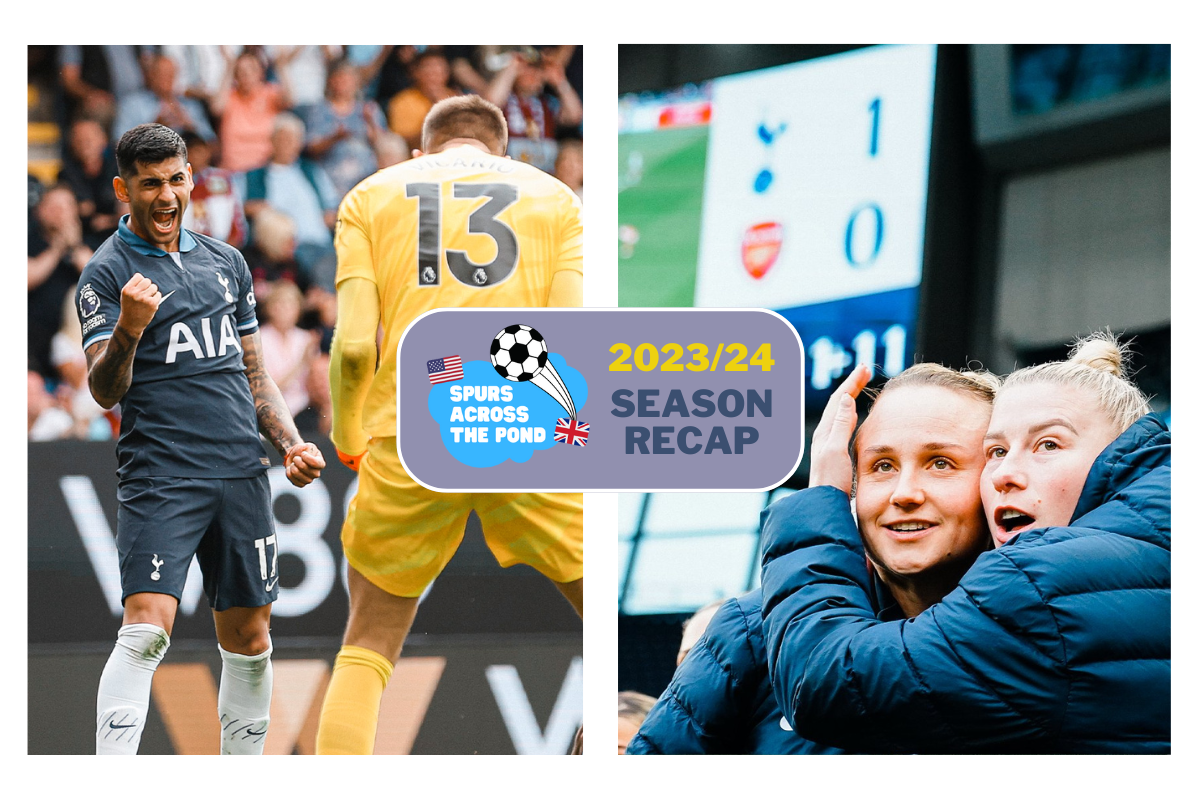
As always, this season wrap-up issue is a true bumper special, so grab your favorite beverage, kick back, and enjoy! I recommend reading this issue on a computer for the optimal viewing experience (heavy image loading, ahoy).
Tottenham Hotspur Men 2024/25
17th place — 38 points
11-5-22 record
-1 GD (64 for, 65 against)
Honors:
Europa League winners
PL Save of the Month (Guglielmo Vicario, April 2025)
Season synopsis:
After an encouraging pre-season (minus the Bayern Munich friendlies) that included goals from youth players and a surprisingly strong showing from Djed Spence, the Men's team looked poised to build on Ange Postecoglou's positive first season.
New signings included plenty of young up-and-comers (Archie Gray, Wilson Odobert, and the official arrival of Lucas Bergvall) and an experienced Premier League-level striker, Dominic Solanke. The aforementioned Spence felt like a new signing after his previous exile from the club on a series of loans. Mikey Moore was poised to make his breakout at the senior level.
Perhaps more significantly, the long-delayed clear-out of the squad began in earnest, with several mainstays of the team (like Oliver Skipp, Emerson Royal, and Pierre Emile-Højbjerg) departing alongside players who had never solidified their roles in the roster.
There were some early warning signs that things might go awry, like the 1-1 draw on opening day at Leicester and back-to-back losses to Newcastle United and Arsenal. But we were scoring lots of goals already and got off to a decent start in two cup competitions, the League Cup and the Europa League. The latter came with new challenges because of the introduction of the "league phase" format, which added two more games to the season tally right off the bat. Interestingly, we wouldn't lose a game by more than one goal in any competition until late December, so the results were at least controlled, if not all perfect.
The injury crisis curse struck again, around the same time as last season. Micky van de Ven suffered his obligatory hamstring strain, but the biggest loss this time around was Guglielmo Vicario, who broke his leg in a thrilling 0-4 win at Manchester City. This accelerated the process to bring in a new goalkeeper, with the club opting to sign Antonín Kinský sooner than the original plan of summer 2025. But until the winter transfer window opened up, we had to make do with an aging Fraser Forster and Brandon Austin finally making his senior debut after nine years at the club.
We went on a five-game winless run immediately following Vicario's injury, and the 3-4 loss to Chelsea had me so distraught that I made a timeline of key moments for this newsletter. Remember that brief moment when we got to laugh at Cucurella losing his boot? Happiness can be so fleeting.
However, we kept things running in the cup campaigns, including reaching the two-legged semi-final of the League Cup. The first leg, at home, was a remarkably gritty performance that ended in a 1-0 win thanks to Bergvall's first goal. The second leg, at Anfield, was a crushing 4-0 defeat. We were then knocked out of the FA Cup in the very next game, losing 2-1 at Aston Villa.
We had already dropped to 14th in the Premier League table by this point, so the opportunities for success this season were narrowing quickly. It was still feasible, though not likely, that we could sneak back into the top half of the table and secure European qualification, but winning the Europa League was the more likely route to redemption. During this period, we witnessed one of the highlights of the season with three homegrown players scoring their first senior Spurs goals in the win against Elfsborg.
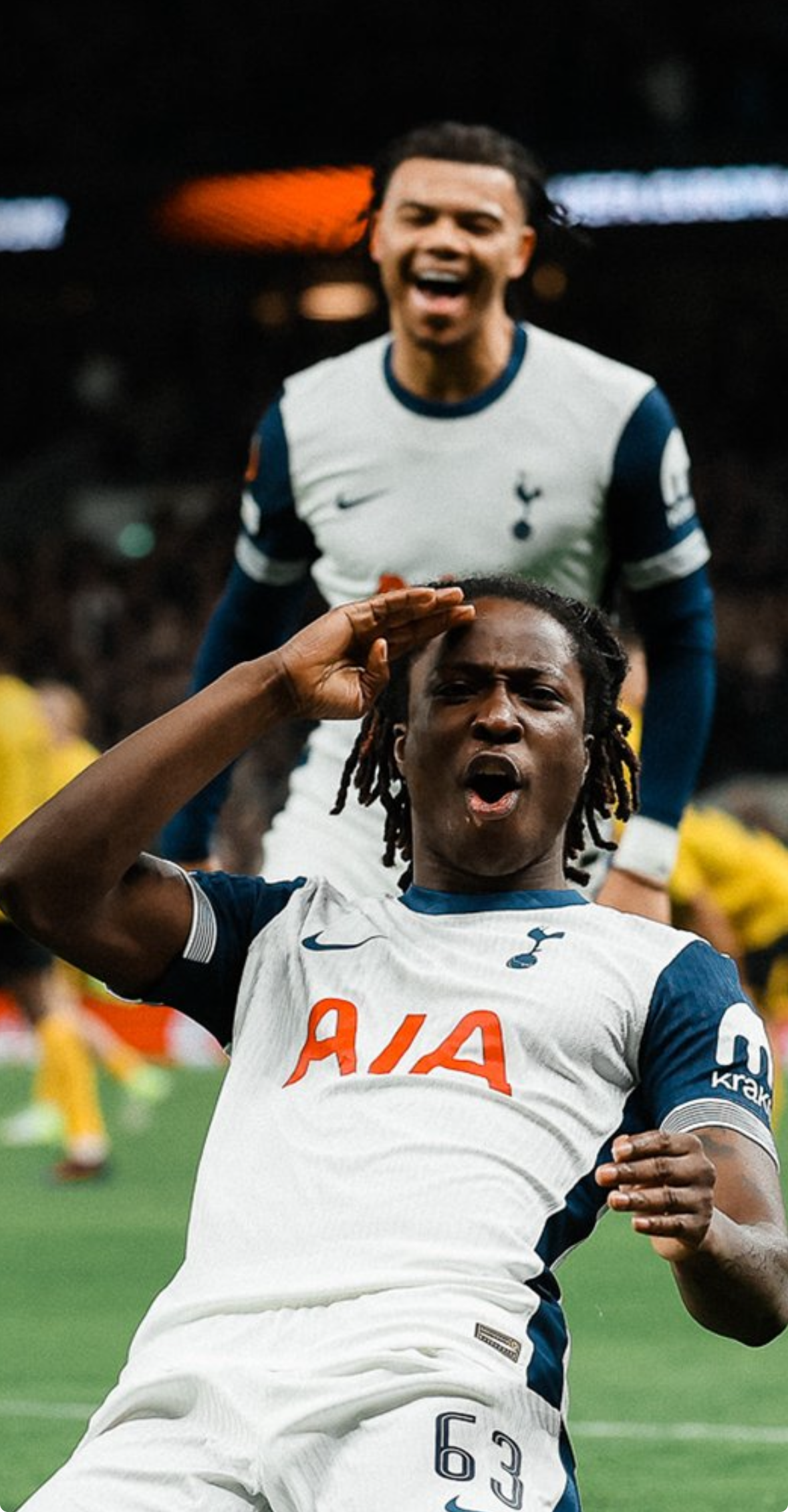
The injury crisis deepened even further in February with backup centerback Radu Drăgușin tearing his ACL in the Elfsborg game—where he was himself a substitute for Van de Ven, who reinjured his hamstring after (it would seem) returning too soon, the second such occurrence this season. Postecoglou came in for a lot of criticism this season for how he handled both squad rotation and injury returns.
Even as we committed full effort to the Europa League campaign, it wasn't smooth sailing; both the round of 16 and quarter-final ties began with a disappointing result (a loss in the away leg against AZ Alkmaar and then a draw in the home leg against Eintracht Frankfurt). In both ties, we were able to recover and advance to the next stage of the competition, but it didn't inspire confidence for the semi-final tie against Bodø/Glimt, which would end with the away leg. Suffering a humiliating 5-1 away loss to Liverpool didn't help improve the mood, nor did the preceding league losses to Nottingham Forest and Wolves.
But all the worry turned out to be for naught as the team beat the Norwegians 5-1 on aggregate, securing a place in the final in Bilbao. We then had two dead rubber fixtures in the PL to get through without picking up any more major injuries, after losing James Maddison in the semi-final home leg and Bergvall in a training injury ahead of that match. The bad luck struck again when Dejan Kulusevski took a knock in the Crystal Palace game, ending his season and taking him out of contention for the final. Thankfully, Son Heung-min had returned to fitness in time to feature in the fiinal (though he didn't start), as did the starting centerbacks and Richarlison.
Then we won the Europa League!
It wasn't a flawless game, including the scrappy goal from Brennan Johnson that won the match, but the stalwart defensive effort got the job done. The most lasting image of the game will likely be Van de Ven's heroic goal-line clearance. Vicario also made a big difference with a last-minute save.
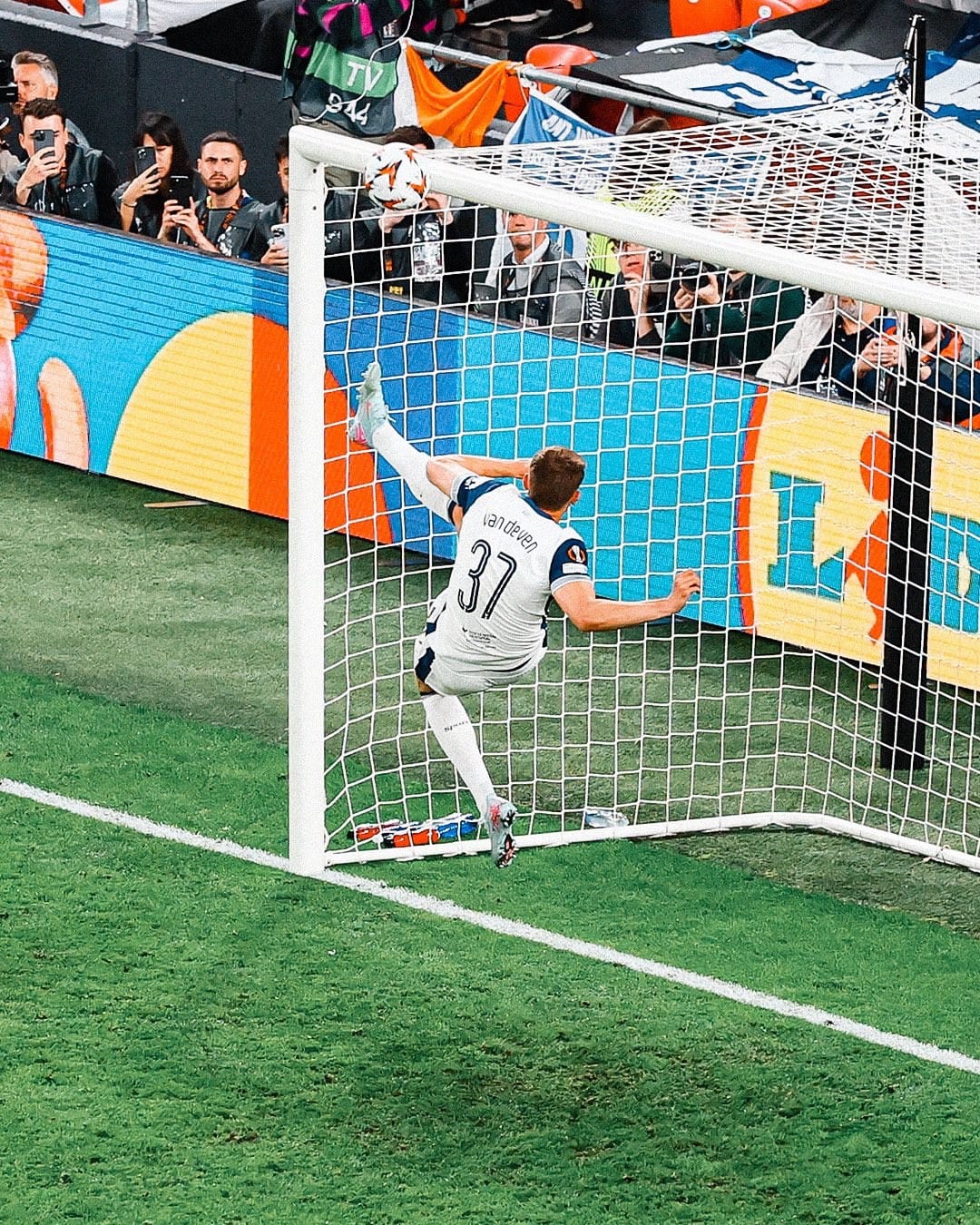
The open-top bus parade was a true moment of joy for both the fans in attendance and those of us watching from far away on the livestream. The players got to let loose after the weeks of tension leading up to the final, paradegoers danced to a playlist of songs associated with Spurs, Son Heung-min had another chance to hoist the trophy as captain, and Postecoglou made a bold statement about "season 3" to confirm his intention to stay on as manager.
The final league match of the season was a 1-4 loss to Brighton, but the home crowd was rightfully more focused on congratulating the team for winning the Europa League than fretting about yet another PL loss. The cumulative effect of so many losses in the domestic league was learned a couple of weeks later, as the board made the decision to sack Ange Postecoglou.
Takeaways:
It's not fun to dwell on negatives in a season where we won a trophy, but there were unfortunately too many to ignore—and ultimately cost Postecoglou his job. He was unable to handle the (admittedly severe) injury crisis and balance the multiple competitions that Spurs competed in, though there were some clear gaps in the squad that made the situation even more difficult to navigate. Still, with the notable exception of the Elfsborg game, he was often reluctant to utilize Academy players for rotation and aggravated some of the senior players' injuries in the process. There are arguments to be made that Postecoglou wasn't fully "backed," but it also seems evident that the highs of "Angeball" were never sustainable from a player fitness perspective.
There’s also some cognitive dissonance around just what stage of the rebuild we’re in, particularly with the complication of having won a trophy earlier than could have reasonably been expected. Fanbase expectations shifted when they probably shouldn’t have; this was always year two of what was supposed to be a long-term project.
All that being said, if we believe the squad is still too thin, that undoubtedly makes the Europa League final win an over-performance. It seems that the board took that interpretation into account when deciding to fire Postecoglou. We won an extremely nervy final by a one-goal margin; that doesn’t exactly scream sea change. It would be a bit naive to think Ange's work was done and everything was going to be rosy from then on out. The harsh reality of the 38-game Premier League grind and entering the Champions League as decided underdogs was looming ahead of us next season.
But that's not to say that what Postecoglou and the team achieved with the EL win has no bearing on the coming seasons under a new manager, whom we now know to be Thomas Frank. With the recruiting enticement of CL football, we can build from a position of strength, rather than bunkering in from a situation of collapse—which would have been likely if the EL final had gone the other way. We could still see some players move on who were loyal to Potsecoglou, but it's more likely that the majority of the squad will be excited to continue developing alongside each other and take on the new challenge of the top-tier European competition. Player departures that could have been painful in other circumstances can now be approached with peace since there are no regrets about them leaving without ever winning a trophy at Spurs. And since almost all of them were involved in the EL campaign, they can truly say they did their part to earn the title.
Fun Facts!
Well, not all of these are fun, per se, but they are notable. I focused solely on the Premier League for this selection of stats, unless otherwise noted.
• 17th place, 38 points, and 22 losses were all club record lows for the Premier League era.
• 22 losses is also the most ever for a PL team that didn't get relegated.
• We scored ten fewer goals than last season, and conceded four more goals.
• We didn't have a negative goal difference until the final matchday.
• We conceded one more own goal (4) than we drew (3).
• We converted an equal number of penalties as we conceded, although one of the four penalties we won was not converted.
• 73% of our goals were assisted, slightly down from last season's 78%.
• We kept just six clean sheets in league play.
• The first half of the season was more successful; we gained ten fewer total points in the reverse fixtures in the second half.
• Overall, we earned 20 fewer points from the same fixtures the previous season (newly promoted teams excluded).
• We did the league double over just three teams (Brentford, Manchester United, and Southampton) and lost both games to seven teams (Newcastle United, Arsenal, Chelsea, Nottingham Forest, Liverpool, Crystal Palace, and Brighton).
• Across the whole PL season, we had 14 different goal-scorers and 16 different assisters; top 3 for goals were Brennan Johnson, Dominic Solanke & James Maddison (tie), and Son Heung-min & Dejan Kulusevski (tie); top 3 for assists were Son, Maddison, and Pedro Porro.
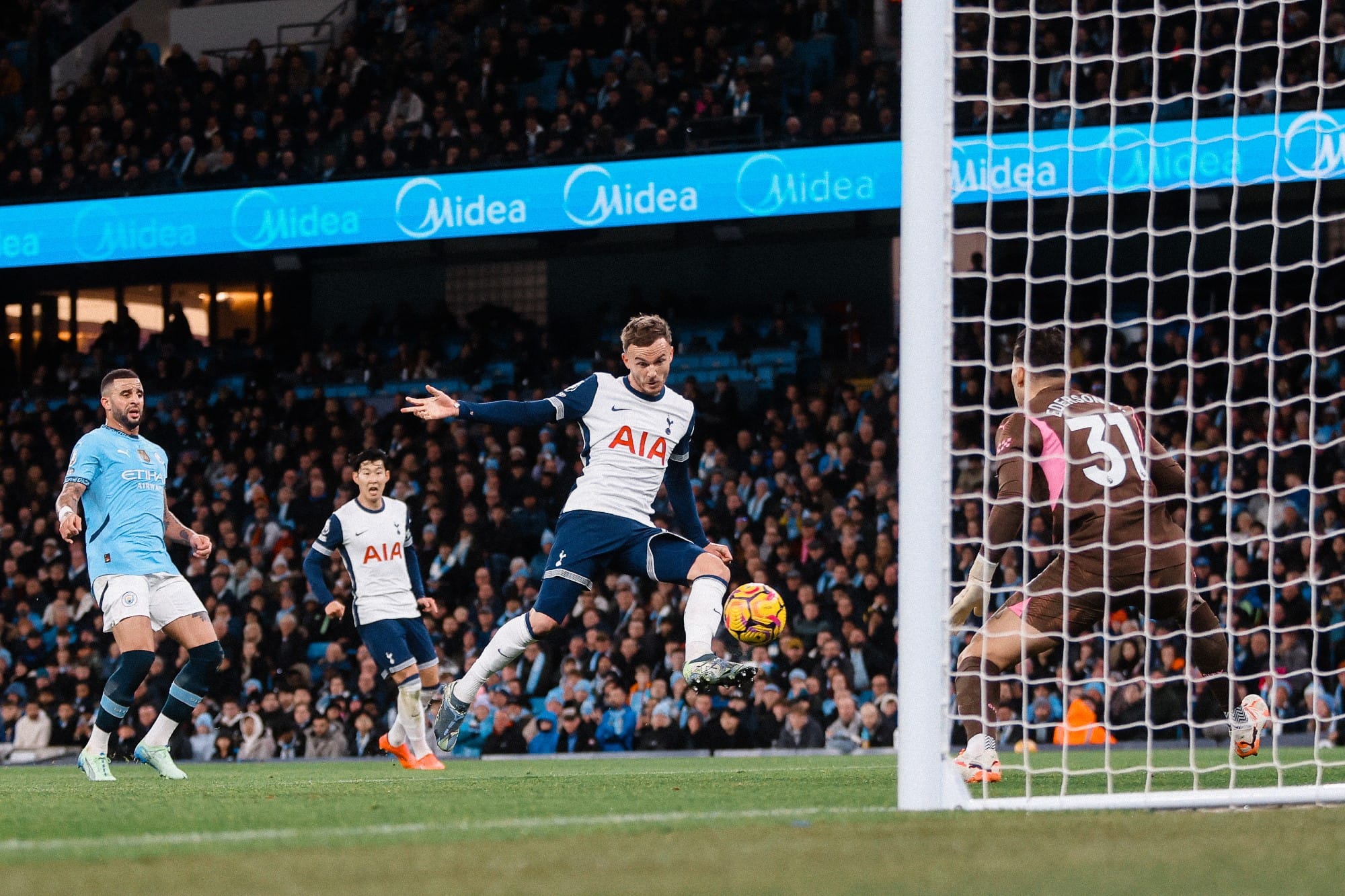
• Five players reached double digits for total PL goal contributions: Son (16), Maddison (16), Johnson (14), Solanke (12), and Kulusevski (11).
• Rodrigo Bentancur led the team in cumulative yellow cards with nine, Yves Bissouma close behind with seven.
• Of the players who made the matchday squad at least once, only seven didn't make an appearance (Alfie Whiteman, Luca Gunter, Rio Kyerematen, Dante Cassanova, Damola Ajayi, Callum Olusesi, and Malachi Hardy).
• Of the players who made at least one PL appearance, only three didn't make a start (Will Lankshear, Dane Scarlett, and Alfie Dorrington). Two players made just one start (Sergio Reguilón and Brandon Austin).
• Six players made their Premier League debut (Mathys Tel, Archie Gay, Lucas Bergvall, Antonín Kinský, Austin, and Lankshear), and three more made their first PL appearances for Spurs (Kevin Danso, Solanke, and Wilson Odobert). Olusesi and Ajayi made their senior Spurs debuts in the Europa League.
• No player appeared in every PL game; Pape Sarr came the closest with 36 appearances, though Pedro Porro had the most starts with 28.
• Son reached 450 appearances in all competitions for the club.
• Ben Davies reached 350 appearances in all competitions.
• Cristian Romero, Porro, Bissouma, Sarr, Bentancur, and Kulusevski all reached 100 appearances in all competitions.
In Focus
These are just a few topics that I thought deserved special mention or a fresh perspective.
• Squad rotation
For the second season running, we found ourselves in a major injury crisis. There's no denying that pure bad luck played a part, and there still seems to be something funky going on with the team's medical department (despite the changes made ahead of this season). I also suspect there's some truth to the theory of accumulated fatigue from the condensed seasons post-pandemic and the decision to hold a winter World Cup, the consequences of which are finally catching up with the sport's international talent.
But while acknowledging those factors, I still fall in the camp of believing Ange Postecoglou could have done more to prevent the extent of the injury crisis and alleviate it mid-season. Some of his decisions around in-game substitutions and game-to-game rotation seemed suboptimal, all the way from the beginning of the injury woes through to the period when he was blatantly prioritizing the Europa League fixtures.
I was curious to crunch the numbers, so I went back and looked at every Premier League game to see how many substitutions were used, which led to some interesting findings. The opening game against Leicester City was a bit of an outlier in that we were allowed an additional sub due to concussion protocol, and Postecoglou did in fact use all six possible subs. There was one game where he only used two subs (the away loss to Everton ahead of the Hoffenheim game) and another where he only used one sub (against West Ham ahead of the Bodø/Glimt away leg). He only used the full slate of five subs in 17 games, or just under half of the league fixtures. He used fewer than four subs in just over a quarter of the PL games.
My takeaway from that data is that although Postecoglou was preaching the importance of rotation, he often left valuable opportunities to rest players within games on the table. This was partially due to a lack of trust in youth players, but also a reluctance earlier in the season to introduce players like Archie Gray and Djed Spence to a more prominent role, even as injuries started to pile up. In the case of Spence, it was actually revealed to be a bit of a test (or mind game, as I would put it more bluntly) by the manager.
There's no denying that we got to a point in the injury crisis where Postecoglou didn't have many realistic possibilities for rotation (outside of giving Academy players a chance, especially in those league games we had supposedly written off). But the speed with which we got to that juncture was accelerated by squad decisions that Postecoglou made.
• Europa League prioritization
A lot of fans feel like our final Premier League table placement of 17th is never acceptable or understandable, but I do think there have been enough extenuating circumstances (primarily injuries) that explain the underperformance in the league. That's not to excuse what will go down as our record worst league finish, merely to explain it. What’s less forgivable to me is the way the cup campaigns were managed. The confusing cadence of rotation left the uninjured players lacking energy for the domestic cups at key moments.
From a morale perspective, it was costly to have all the eggs in the EL basket at the end of the season—and to have huge financial pressure on the outcome as well. It wasn't hyperbole to say the EL final was the most important match in the club's recent history because of the implications the result would have for seasons to come. Win, and we were back in the Champions League. Lose, and we had nothing to show for after a dismal domestic campaign.
I think it's justifiable to prioritize cup games, but there’s a difference between PL matches not being prioritized and being blatantly disregarded. Plus, prioritizing the cups should usually just entail de-prioritizing select league games before and after cup fixtures; instead, there were entire weeks-long stretches of the season where it felt like we were phoning it in, and not just after the turn of the year/post-January transfer window either.
The team got objectively worse over the course of the season in a way that can’t only be accounted for by injuries; the same players who were keeping us competitive (if rarely winning) in the deepest part of the injury crisis suddenly seemed like strangers to each other and incapable of executing the game plan later in the season when they became part of the de facto “B team” for the PL as the EL campaign continued. With sole focus on EL towards the end of the season, players in the “B team” didn’t seem to be getting the support they needed in terms of match planning and preparation, manifesting as visible frustration at times. With a large coaching staff, it was a missed opportunity to have some staff focusing on developing the many young/new players in the rotated team. Instead, they were forced to wing it. I know I was not the only fan concerned that the effect this separation of the squad was having on individual players' confidence and morale could prove costly if they ended up being needed in the EL final.
I honestly wonder if Postecoglou's claim that the focus was always on the EL was a retroactive attempt to cover for the poor league outcome. However, many of the players have also said that winning the EL was always the goal for the season (in contrast to Postecoglou saying the European campaign was only prioritized after a certain point mid-season), and this would support the evidence of how the league campaign was treated even before the worst point of the injury crisis.
Regardless of exactly when it became "EL or bust," it’s depressing to me how willing and eager Postecoglou was to embrace the idea that this squad could only ever compete on one front. I think that runs counter to the club motto, for one thing, but also counter to reality. No, we weren’t going to win multiple competitions with this specific squad, but we should at least have been able to maintain a respectable position in the PL, lower top half of the table at least. The capitulation is not in keeping with the kind of club we want to be. And we did, in fact, make it to the semi-final of another competition (the League Cup), so Postecoglou contradicted his own progress by denigrating the squad's ability.
This gambit can also only work for one season; beyond that, the manager and club risk angering season ticket holders who are expecting to at least see a decent effort in every home PL game they attend, if not a result. You can’t project an air of not caring about the league over a sustained period and expect fans to still show up, lest it truly spiral into an unmanageable situation. It's clear that the end justified the means for this particular season, but it's not a sustainable strategy.
And frankly, from a management perspective, it was unprofessional to openly dismiss certain competitions' importance. I suspect this is the main reason Postecoglou was sacked. He had two seasons to show what he could do, and it would be negligent to overlook the fact that for most of the second season—by his own admission—he was punting the league. That admission, along with many other pronouncements from his press conferences, suggested that he would not do a better job of juggling the multiple competitions that Spurs would also be dealing with next season. That didn't leave the club with much of a choice but to move on from Angeball.
• New signings stepping up
Now that I've gotten all of that negativity off my chest, I can focus on one of the clear positives from the past season. Many new, young players ended up getting far more game time than expected due to the injury crisis. This isn't a total positive in the sense that some of them had to play out of position at times, and therefore, that game time didn't necessarily contribute to specializing at their preferred positions. But they undoubtedly gained valuable experience in terms of adjusting to the pace of the Premier League, building chemistry with their teammates, and playing in important games early in their careers. Archie Gray suffered the most from the lack of positional consistency but still made an impact, while Lucas Bergvall and Wilson Odobert had their breakout seasons tempered by injury disruptions. Antonín Kinský also made a big difference immediately upon signing, filling the gap in the goalkeeper ranks while Guglielmo Vicario was injured, as did Mathys Tel in Son Heung-min's stead for the forward line. And while not a young player, Kevin Danso also deserves credit for coming in and getting the job done when needed. He will surely play a frequent role next season as well.
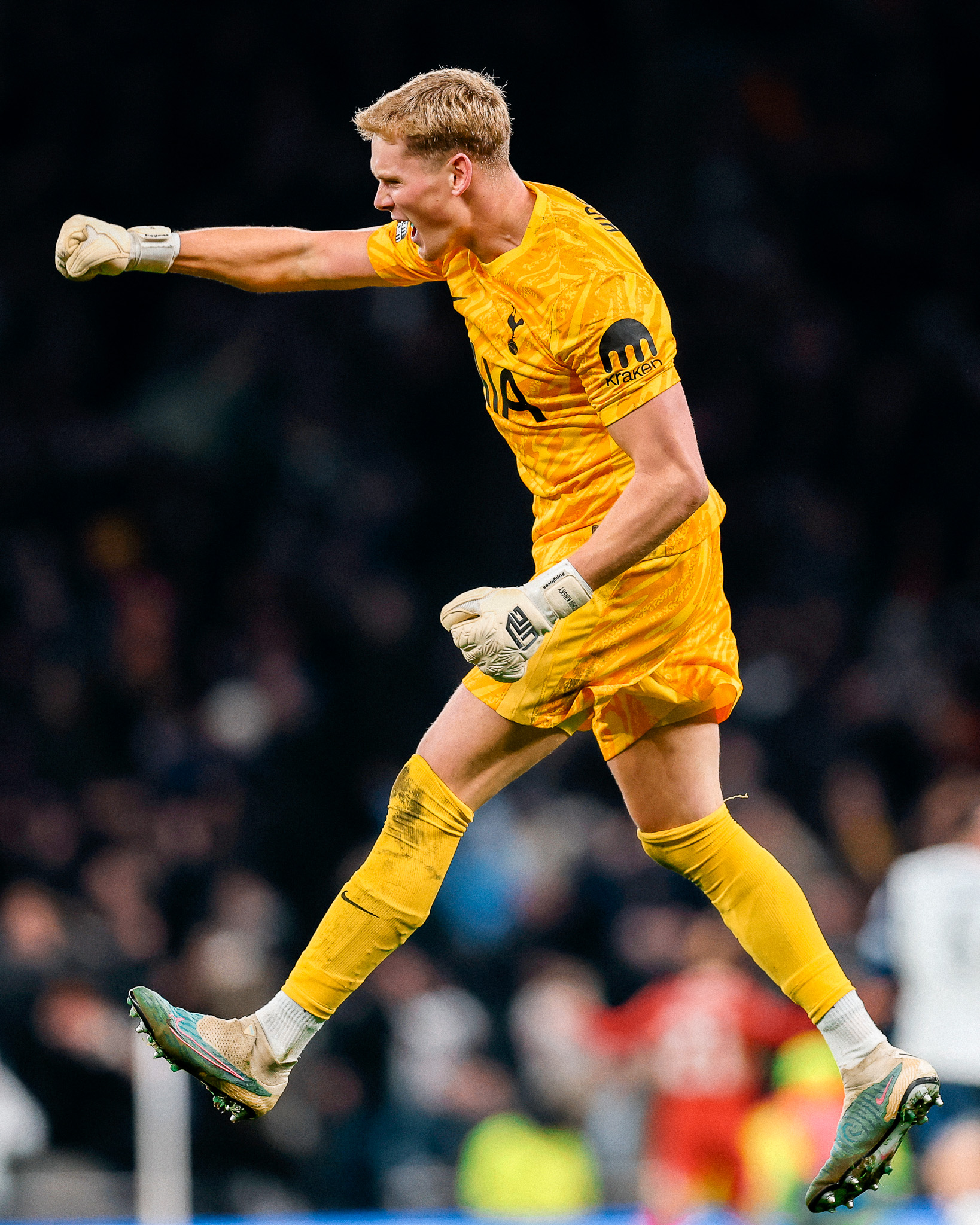
First Goal Inductees 🎉
Players who scored their first goal for Spurs, in any competition:
• Yves Bissouma
• Djed Spence
• Dominic Solanke
• Will Lankshear
• Lucas Bergvall
• Mikey Moore
• Damola Ajayi
• Dane Scarlett
• Mathys Tel
• Wilson Odobert
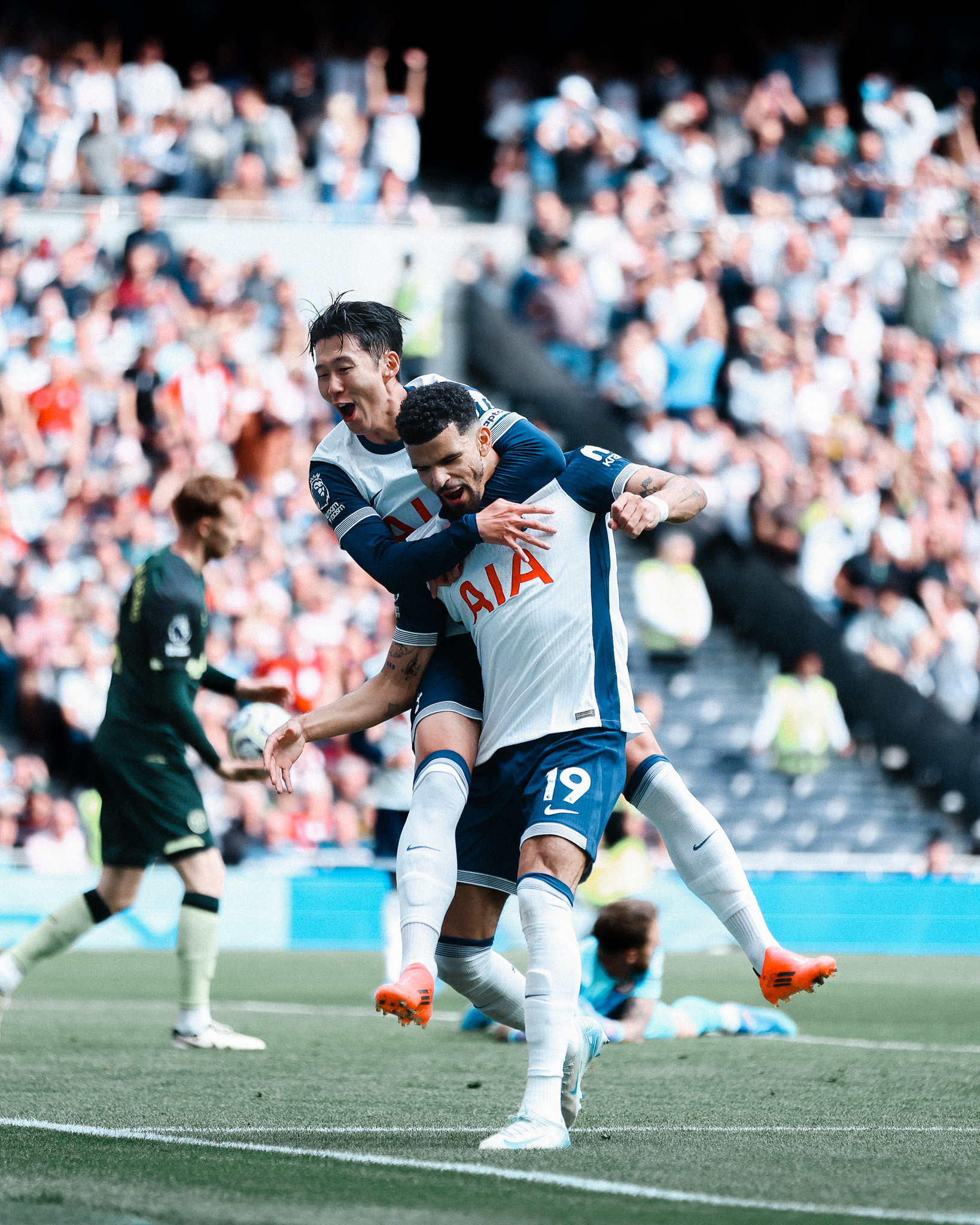
Best Moments
• Micky van de Ven's running assist for Brennan Johnson at Manchester United
• Djed Spence's first Spurs goal in the League Cup win over Coventry City
• The comeback from an early red card against Qarabağ
• The 4-1 win against Aston Villa after the tough loss to Ipswich Town
• The dismantling of Southampton—literally, their manager was sacked
• Lucas Bergvall's first goal in the League Cup semi-final home leg win against Liverpool
• Three of our own scoring their first goals against Elfsborg
• Pedro Porro's backheel equalizer against Eintracht Frankfurt
• Johnson again... and again... and again!
• All four of the wins against Manchester United—and two against Manchester City
• Lifting the Europa League trophy, and the bus parade
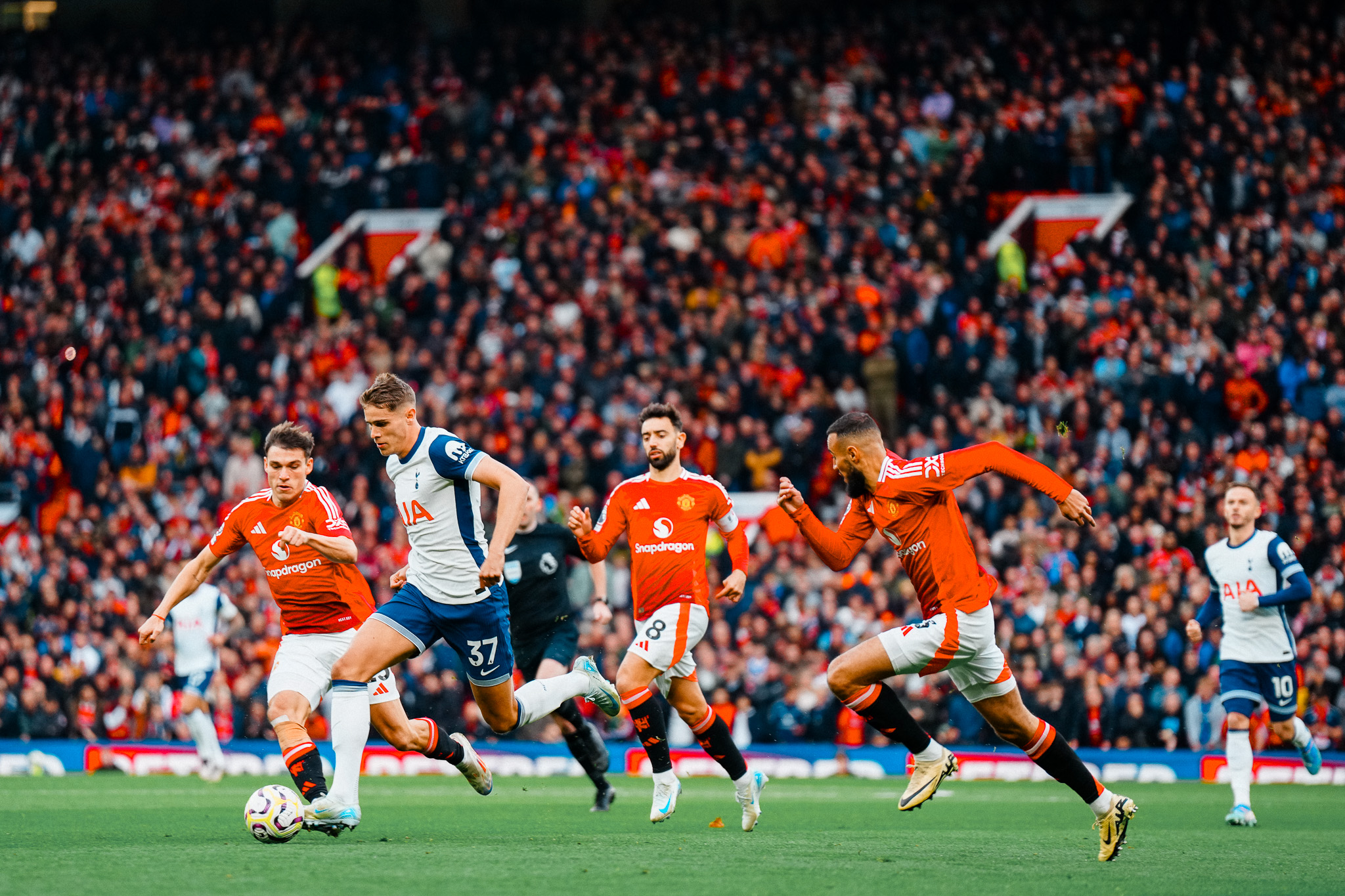
Worst Moments
• Learning that Guglielmo Vicario broke his leg in the 0-4 win at Manchester City
• The entire festive fixtures period
• Regulation time of the FA Cup tie against Tamworth
• Both North London Derby fixtures
• Losing to two out of three newly promoted teams
• The away leg of the League Cup semi-final against Liverpool
• Ange's ear cupping incident at Chelsea
• Losing 11-4 on aggregate to Liverpool in the league fixtures
• Stressing about artificial pitches at Tamworth and Bodø/Glimt
• Pretty much every PL game in the final third of the season
• Losing twice to six out of the top eight teams in the PL table
• Our bench's worth of injuries
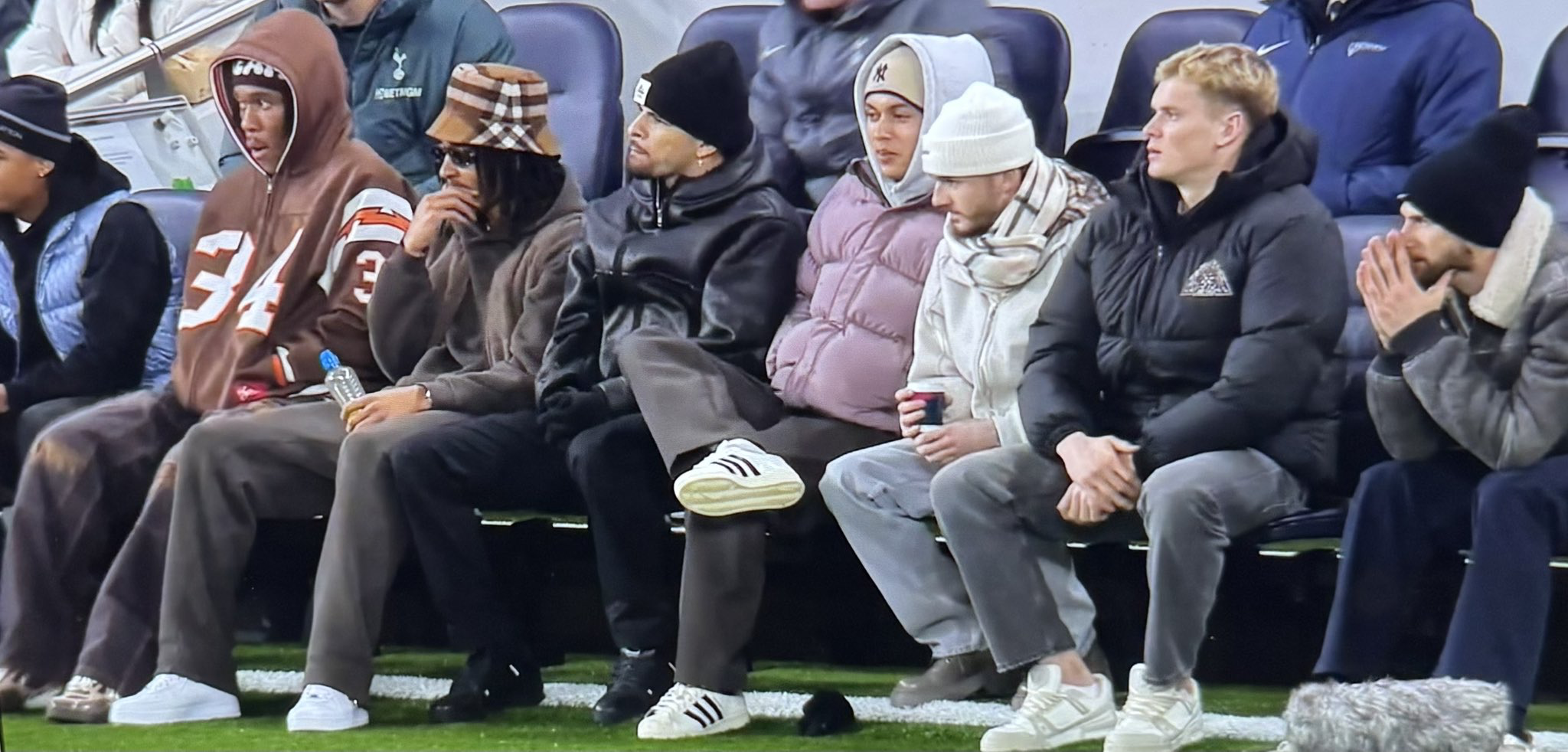
Player Superlatives
As usual, I made sure to spread the love around. Best young player is reserved for a player 21 or younger.
Biggest surprise: Antonín Kinský
Best new signing: Archie Gray
Best young player: Lucas Bergvall
Most valuable player: James Maddison
Most improved player: Djed Spence
Mr. Tottenham: Pedro Porro
Player of the Season
Drumroll please...
The nominees are:
✴︎ Son Heung-min
✴︎ James Maddison
✴︎ Dominic Solanke
And the winner is:
Brennan Johnson!
Beyond just leading the team in goals across all competitions (with 18), Johnson had a penchant for showing up in big moments. None was bigger than the Europa League final.
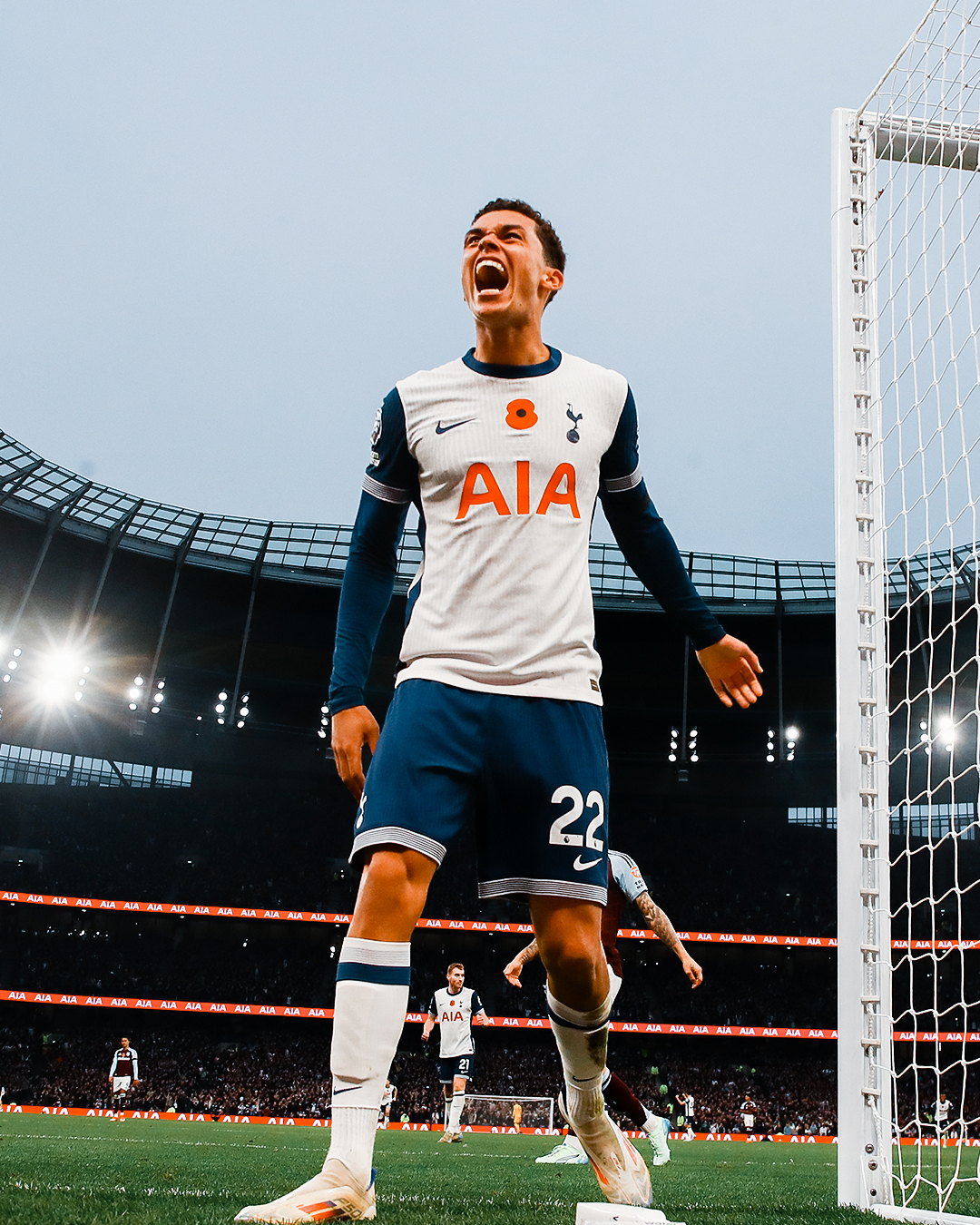
It became a running joke that "all he does is score goals," but I have a lot of time for a player who puts their head down and gets results. Johnson took that concept literally when he deactivated all of his social media ahead of going on a goal-scoring streak. Hopefully, going into next season, he will start to receive more appreciation than abuse from the fanbase.
Season rating out of 10: 6
I was very tempted to give a 5 rating to reflect the mixed nature of the various competition outcomes, but upon considering, I think the positives of the season are so positive that they slightly outweigh the negatives. Those positives are, of course, the Europa League win and the significant game time for the contingent of young players and new signings. And I cannot be truly mad about a season in which Son Heung-min finally got to lift a trophy for our beloved club. Although his future at Spurs is uncertain, I feel optimistic about the core of young players in the squad being able to grow together over the next few seasons and create more moments of magic.
Questions and concerns:
Here are a few musings on the past season and looking forward to next season.
• Can Thomas Frank improve the defense?
Defense was my biggest concern in the Ange Postecoglou era. We didn't see much improvement in that area under his tenure, except for perhaps set piece defense (which went from catastrophic to only occasionally costly). It’s all well and good to prioritize an attacking style of play, but at the same time, the defenders aren’t there for set decoration. We need the next manager, Thomas Frank, to get more out of the defense as a unit, and not just in terms of their attacking contribution—which was admittedly strong at times under Postecoglou.
• What will the midfield look like?
This is the area of the squad where I'm most curious to see what Frank has planned. It's obvious that the only true #6 we have in the team (until he is likely transferred) is Yves Bissouma, but even he is not a reliable option. We may see a move away from the single #6 to a double pivot that will better suit players like Rodrigo Bentancur and Lucas Bergvall, as well as Archie Gray, who still needs a lot more experience in the midfield to begin with. Pape Sarr is also a question mark, and Dejan Kulusevski could be transitioned back into the forward line under the new manager. Lots to experiment with!
• What are the realistic goals for 2024/25?
If we're talking trophies, it would have to be targeting one of the domestic cups. The jump in level from the Europa League to the Champions League is simply too stark for us to be likely contenders (especially with our squad still in a rebuild), and we also have a lot of ground to make up in the Premier League after last season's disastrous table finish. In terms of benchmarks for those competitions, getting through at least one knockout round in the CL would be respectable, and a top 5 finish in the league seems challenging but doable.
On a squad level, continued development of the youth players will be important. Players like Mathys Tel and Wilson Odobert are primed for a strong season now that they'll have a full pre-season under their belts (as well as the U21s Euro tournament experience with France).
And as I alluded to above, becoming a more well-rounded team should be a focus to avoid falling into the same cycle of high highs and low lows that we saw under Postecoglou.
Bonus points if we manage to keep injuries to a minimum this season.
Let's bid the Men's team farewell for the summer—at least until the pre-season friendlies—with this gallery of some of my favorite photos from the past season (best viewed in browser).
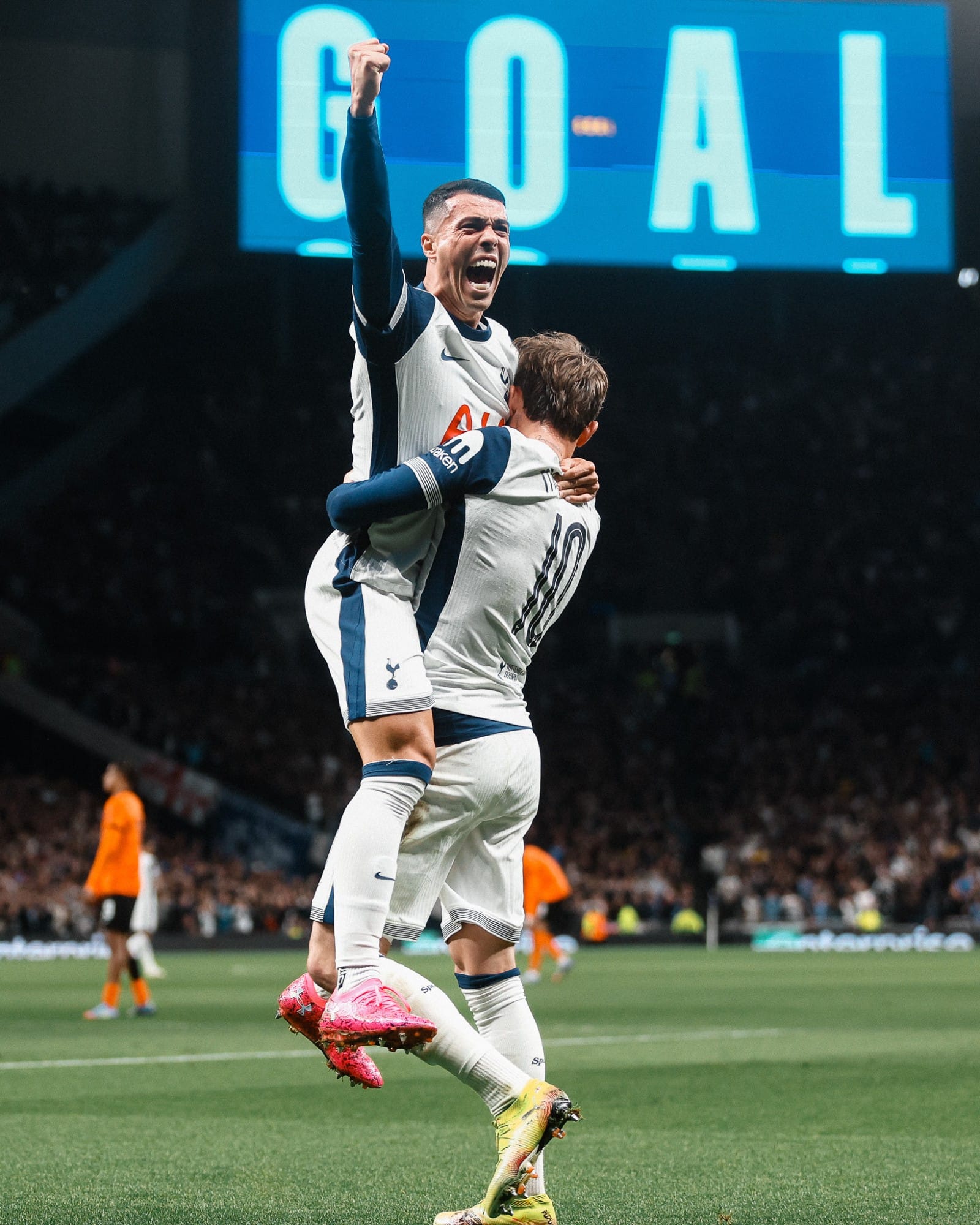
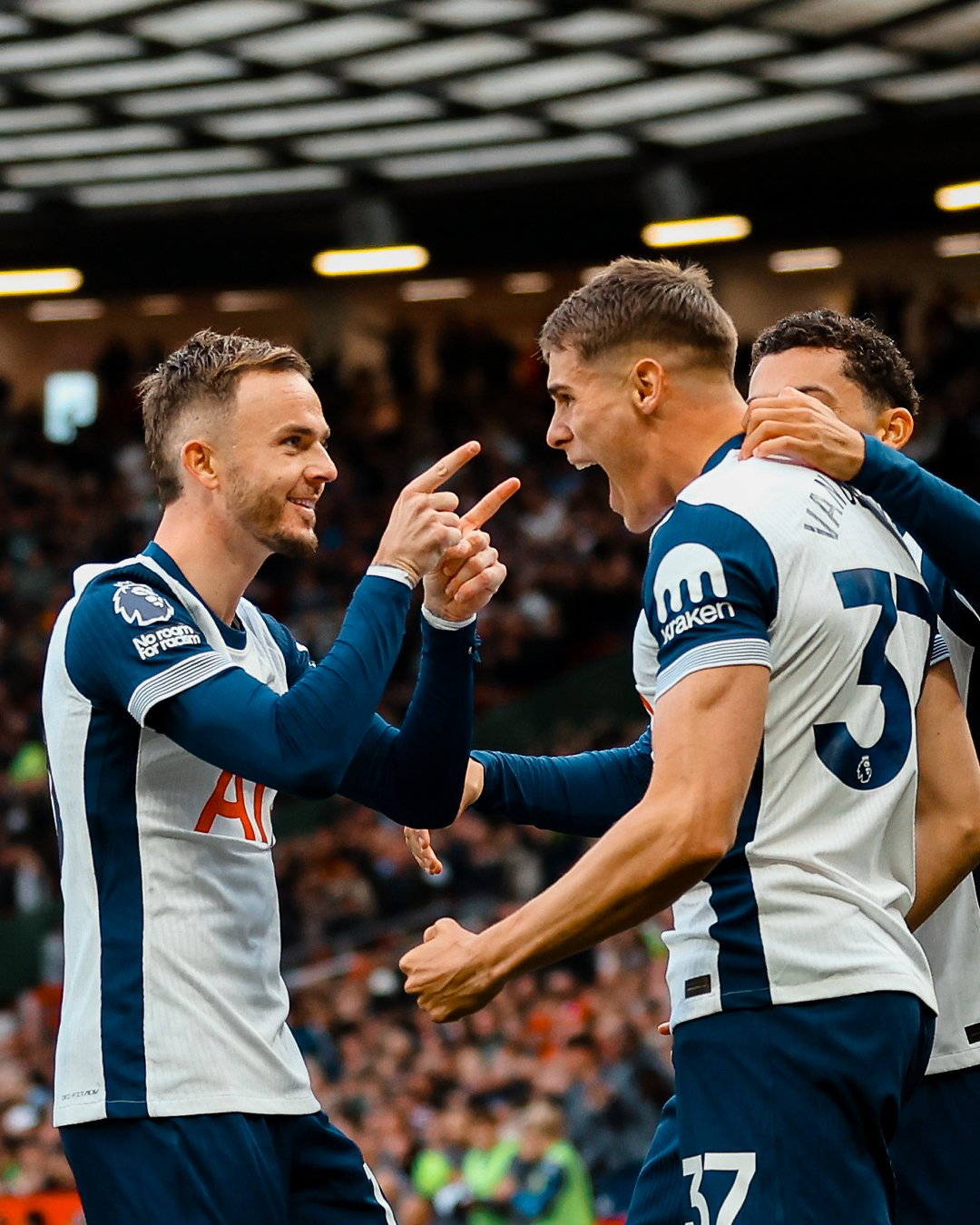
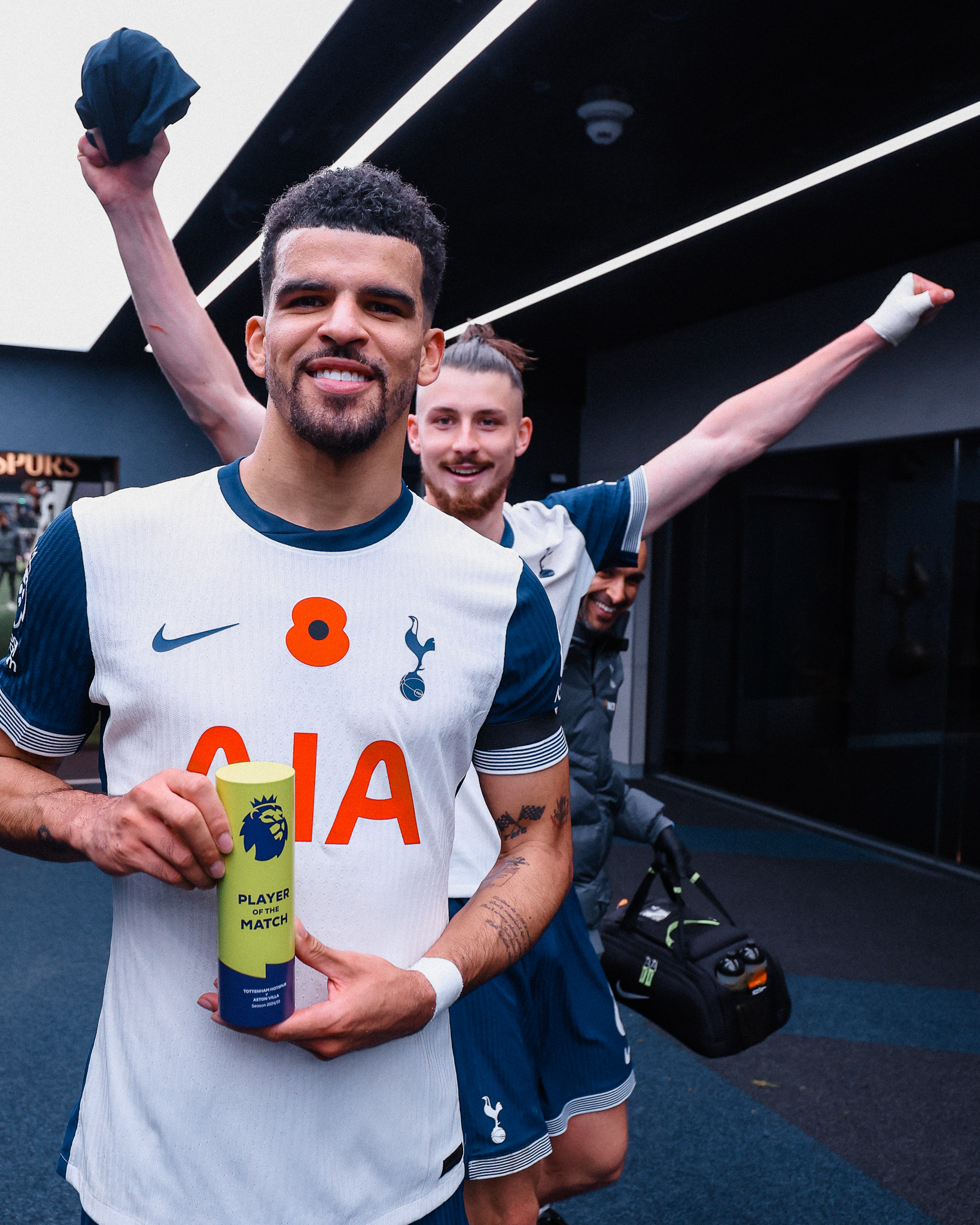
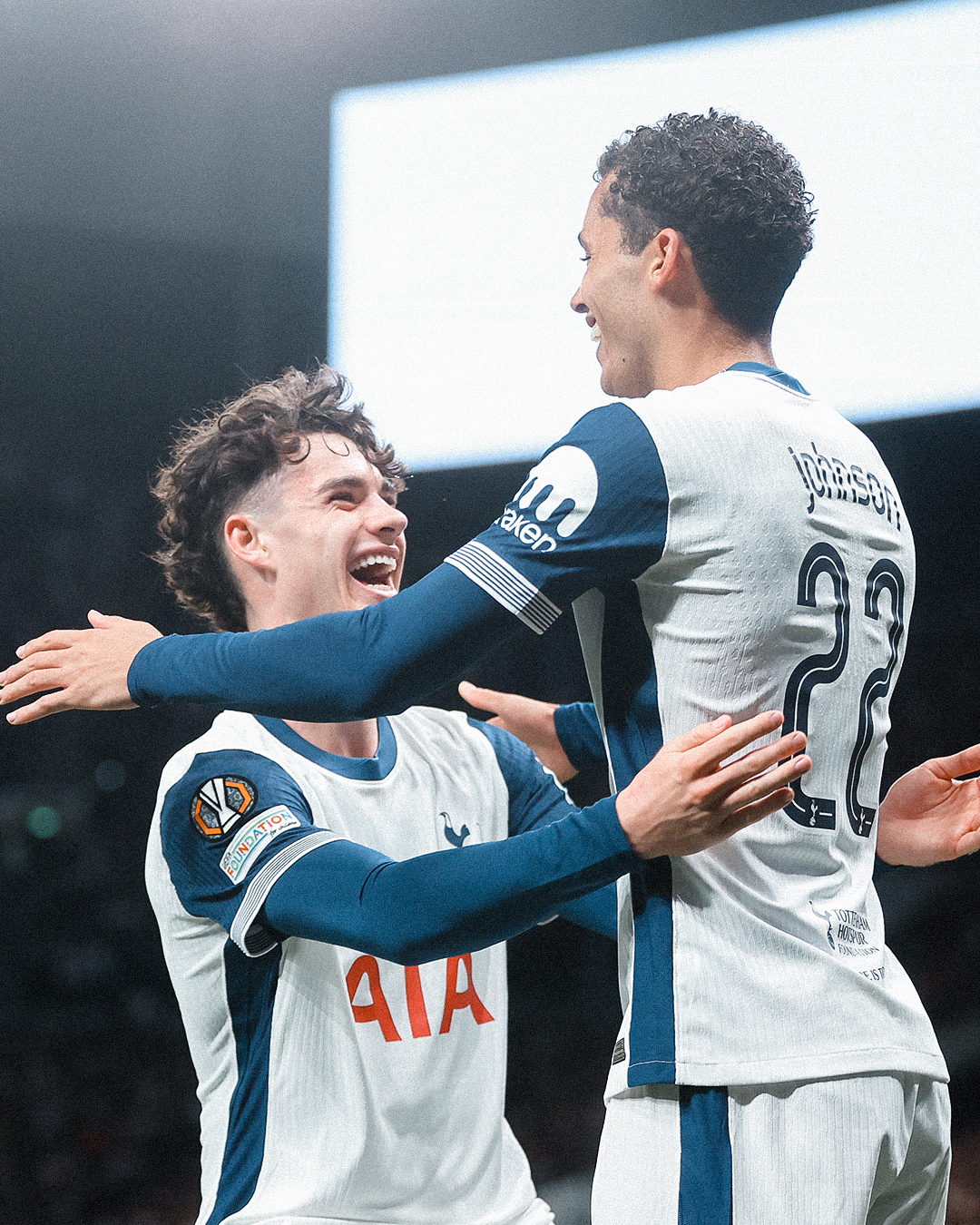
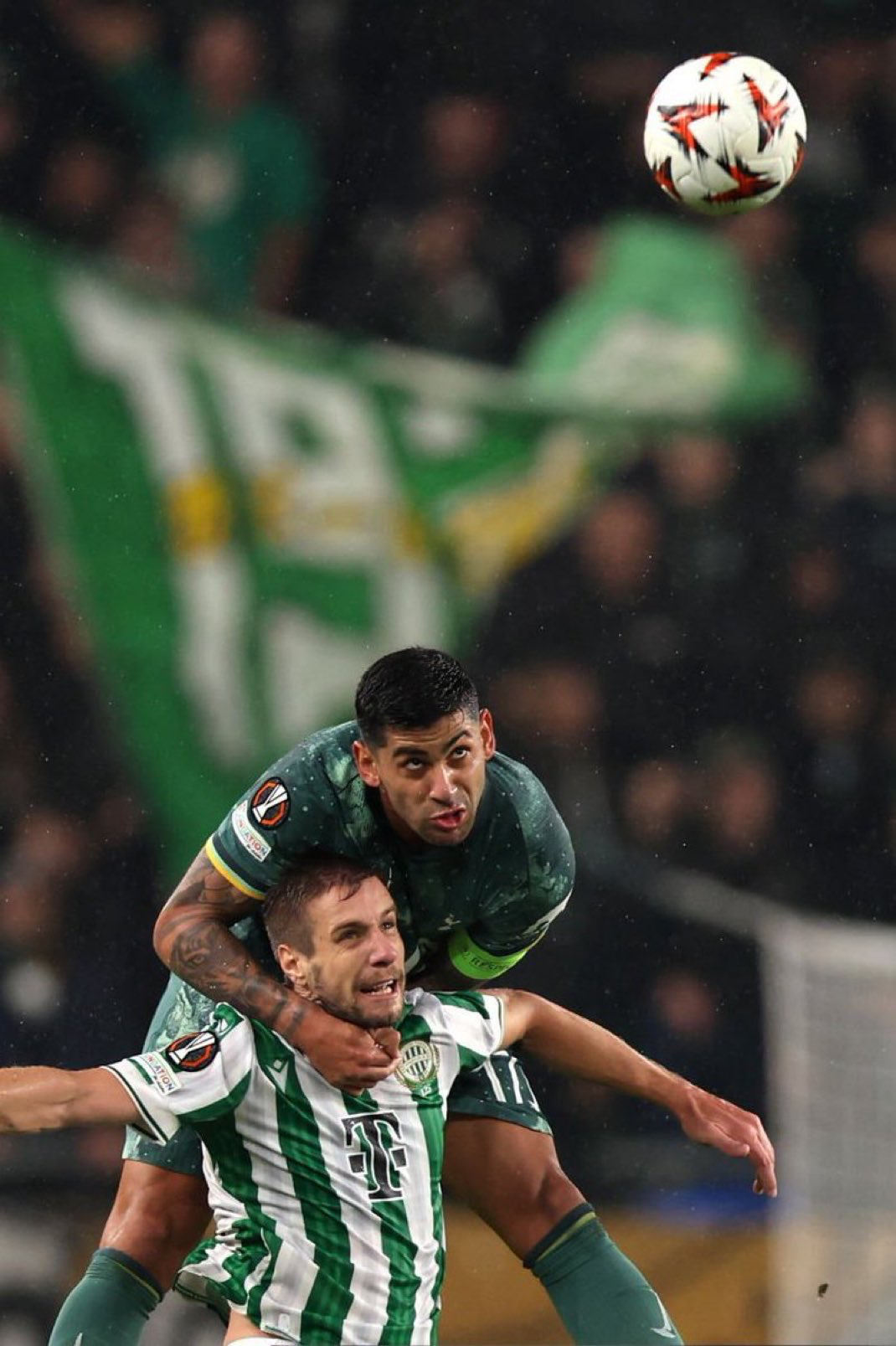
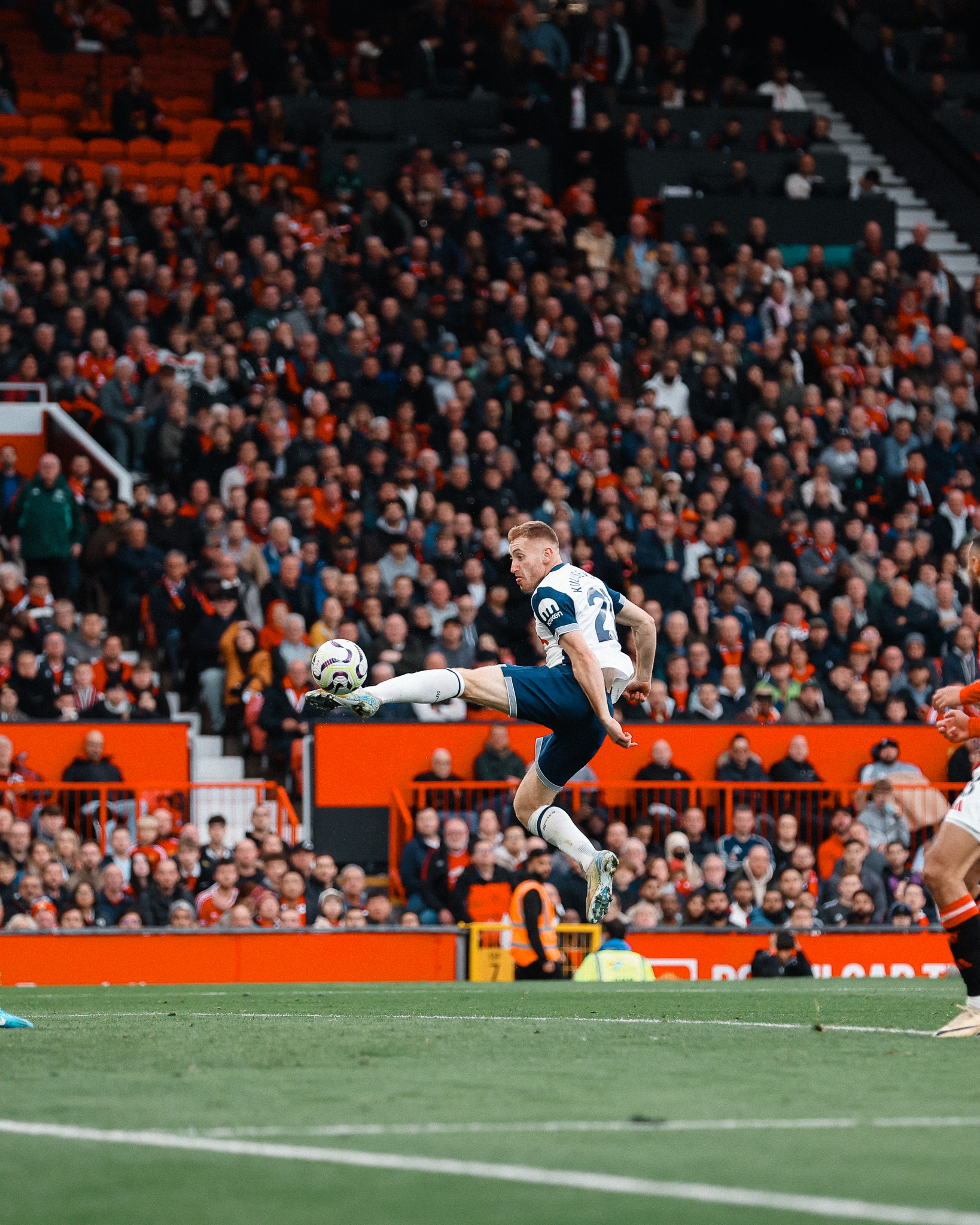
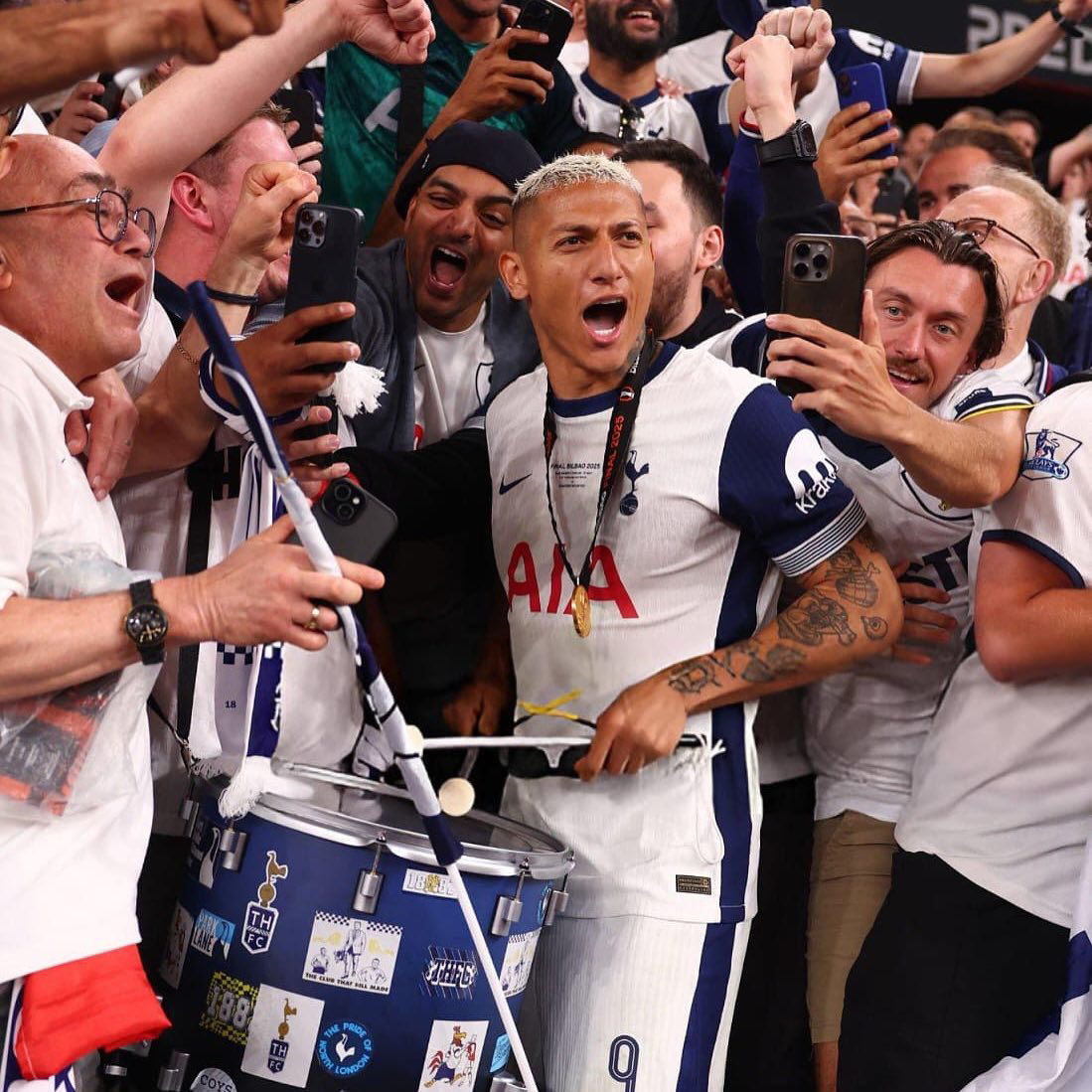
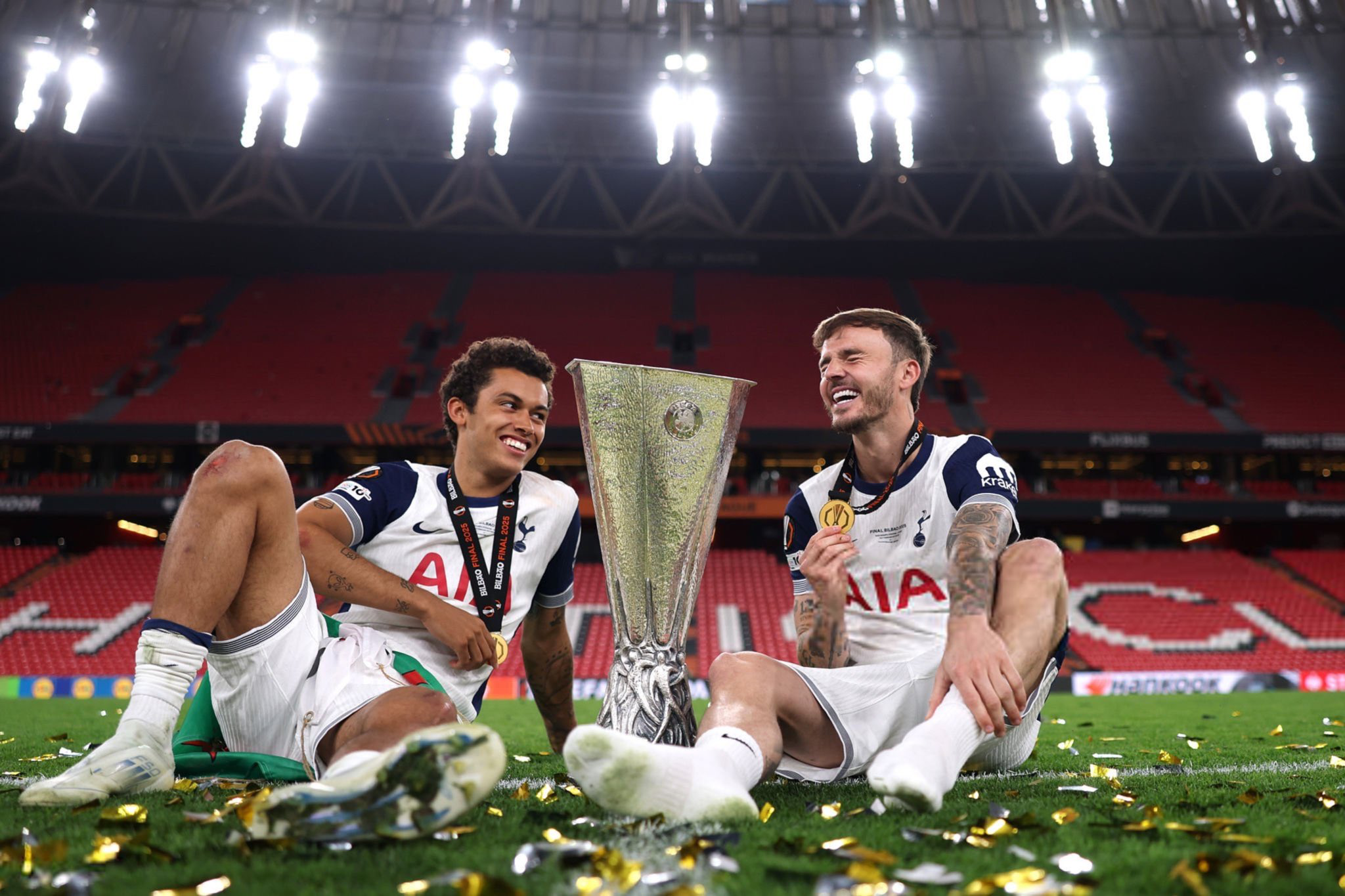
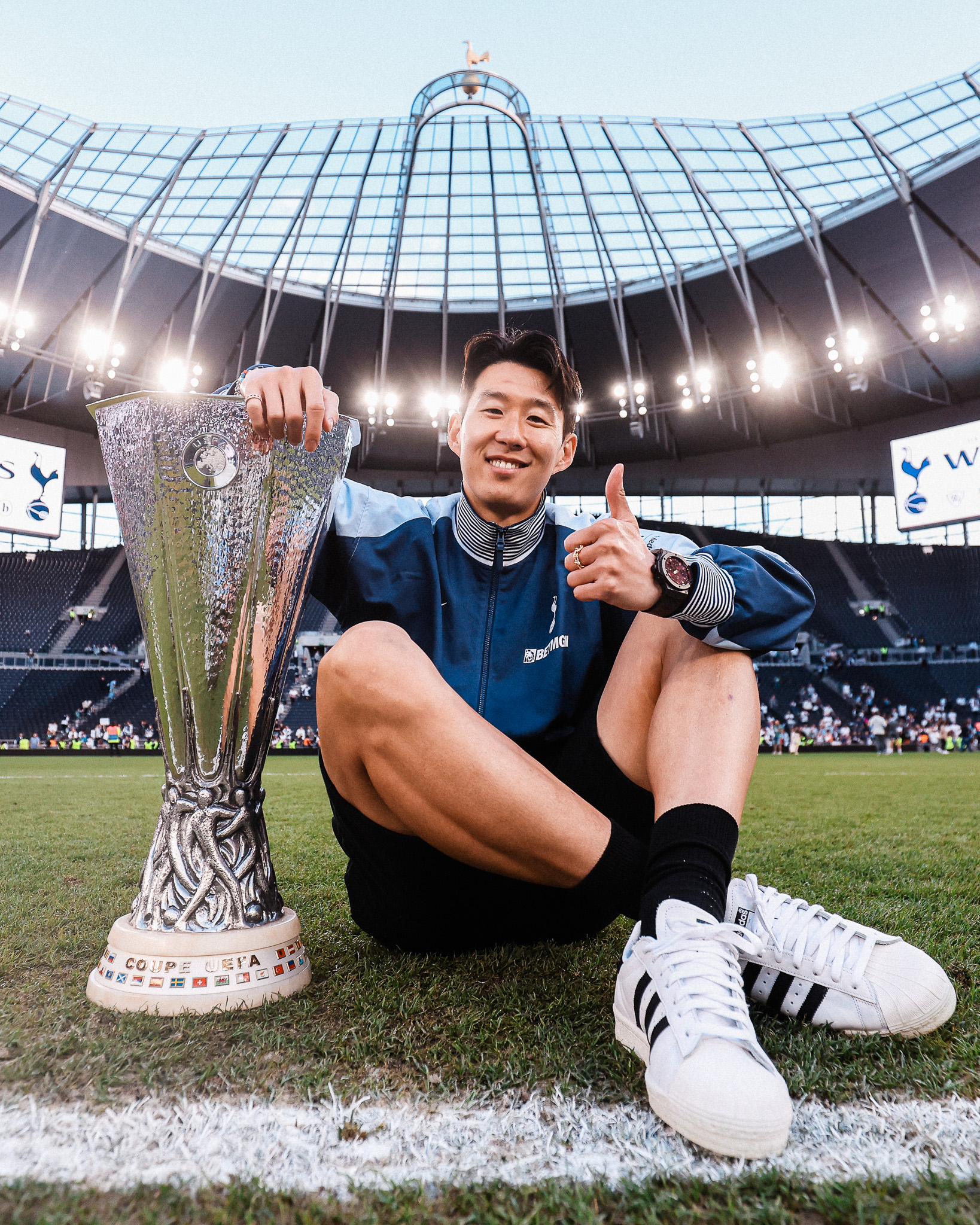
Here's to a restful off-season, a productive pre-season, and continued progress in 2025/26.
Tottenham Hotspur Women 2024/25
11th place — 20 points
5-5-12 record
-18 GD (26 for, 44 against)
Honors:
n/a
Season synopsis:
Once again, it was a deceptively positive pre-season for a Spurs team. We went undefeated across four friendlies, including one opponent from outside England, and only conceded two goals while scoring 11 across the slate of games. Martha Thomas scored in all but one friendly, and Lenna Gunning-Williams contributed three goals, leading us to expect great things from the forward line as the season began.
Returning manager Robert Vilahamn signed a three-year extension during the offseason, which would prove to be a mistake.
A surprise signing of Hayley Raso (itself a reaction to the surprise departure of Celin Bizet to Manchester United, where Grace Clinton had returned after last season's loan), her fellow Matildas regular Clare Hunt, and an intriguing newcomer from Spain, Maite Oroz, balanced out the less exciting signings of Anna Csiki from the Damallsvenskan and a loan signing of West Ham's backup keeper, Katelin Talbert. Ella Morris would remain an unknown quantity for a while as she joined the team with an existing injury.
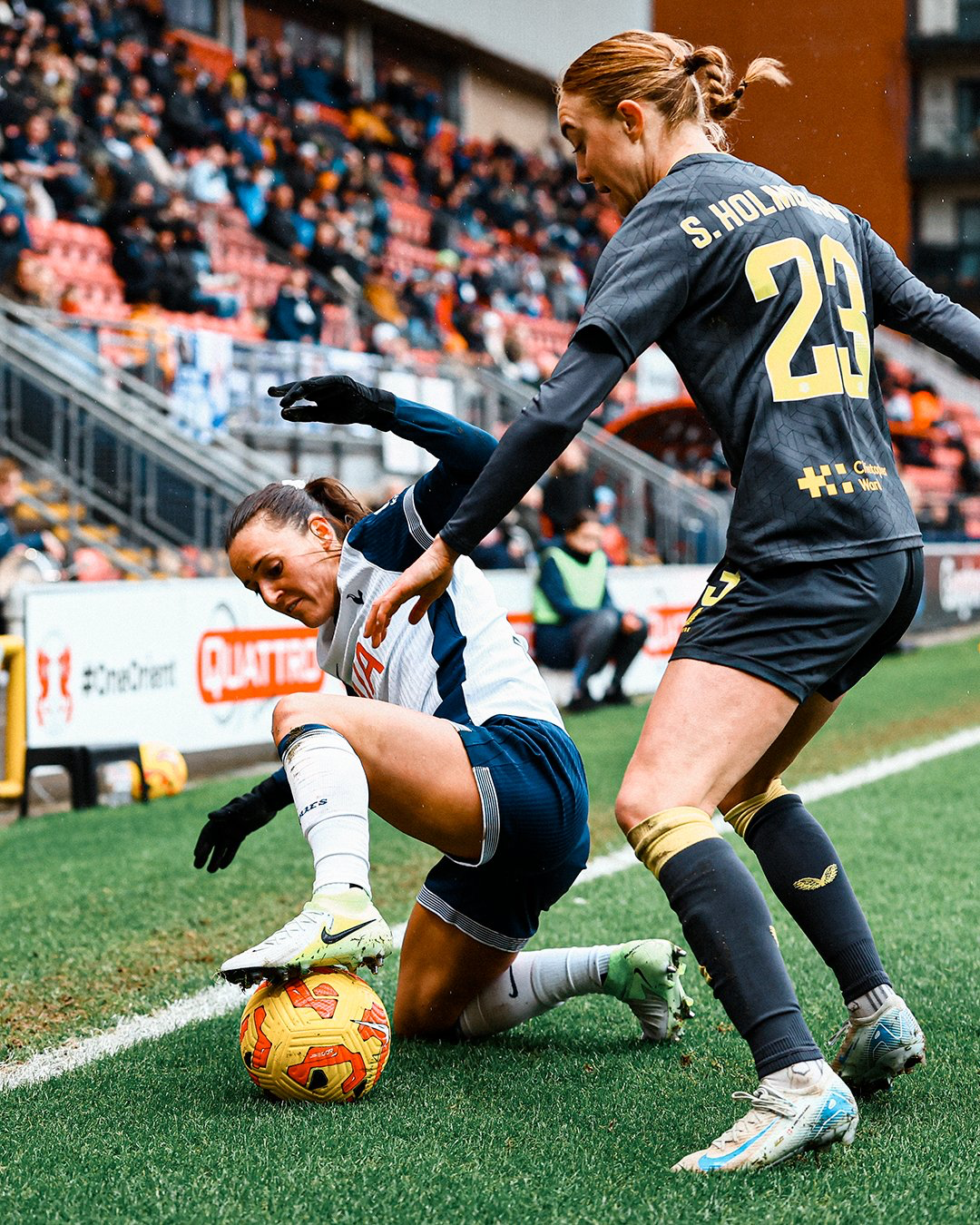
The opening day 4-0 win against Crystal Palace seemed to confirm our predictions of a positive season, especially coming off the back of a 6th place finish and first-ever FA Cup final berth in the previous campaign. We were also encouraged by two new signings getting onto the scoresheet, Raso with a goal and Oroz with an assist. Perhaps most significantly, Beth England did not start but provided an assist off the bench. Would this be a season where the scoring load was distributed evenly across the squad?
In short, no. But let's get back to the synopsis and save that matter for takeaways.
It would be overly dramatic to say that it was all downhill from the opening win, because things didn't get truly dire until the second half of the season. But we did quickly establish that our level in the league was well below the top teams we were meant to be aspiring to compete with. We suffered heavy defeats to the typical top four teams, but also had a crushing last-minute loss to Liverpool and narrowly scraped out wins against teams like West Ham and Everton. We only managed draws with two of the teams who often challenge for "best of the rest", Aston Villa and Brighton. The first half of the season didn't officially end until after the winter break, with a 1-0 win over our relegation rivals from two seasons prior, Leicester City.
However, the League Cup group stage was a bright spot as our goal-scoring output started to dry up in WSL play. We ended the group stage undefeated despite rotating for all of the matches, including several players making their senior club debuts either starting or off the bench.
The most important of those debuts was Eleanor Heeps, who had been at the club since 2021 and never managed to break through during the heydays of Becky Spencer and then Tinja-Riikka Korpela. She got her opportunity due to an injury to the former. Heeps kept clean sheets in both League Cup games she started and only allowed a goal apiece in the two league games she featured in.
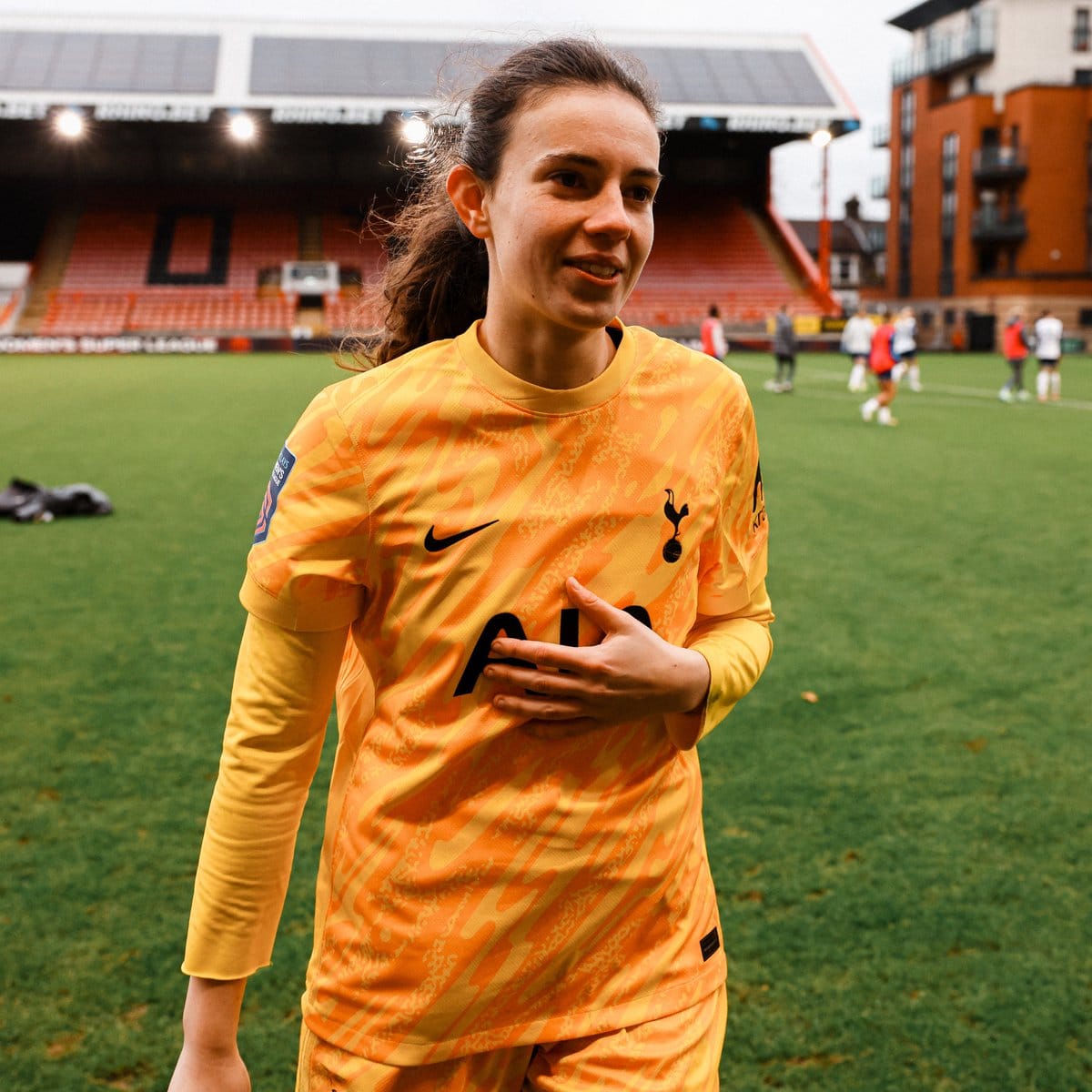
Spencer later left on loan to Chelsea in the second half of the season. Lize Kop was then signed from Leicester to become the new #1 at Spurs. Other January signings included Olivia Holdt, an attacking midfielder who was more often used as a winger by Vilahamn, and Josefine Rybrink, a technically versatile yet overall ineffective centerback/defensive midfielder. Rosella Ayane returned to the squad after a NWSL loan to make a few final appearances for the club.
The second half of the campaign got off to a poor start with an exit in the League Cup quarter-final, losing 1-2 to West Ham United. Thomas scored her sole goal of the season in this match. Read that sentence again.
After the blowout of Crystal Palace on the first matchday, we barely managed a 2-3 win in the reverse fixture thanks to a stoppage-time free kick goal from Holdt on her delayed club debut—she was another signing who arrived at Spurs still rehabbing an injury, which would limit her gametime for several more weeks.
We then went on a six-game losing streak in all competitions, starting with an immediate knockout loss in the FA Cup to Everton, failing to score a goal. A heavy 5-0 loss at Arsenal was bookended by one-goal defeats to both Manchester teams, then followed up by lackluster losses to Brighton and West Ham. In that entire stretch, we only scored once, against Manchester City.
We wouldn't win another game for the rest of the season, but did manage three more draws against Leicester, Liverpool, and Everton on the closing matchday. A would-be comeback draw against Aston Villa was scuppered by a stoppage-time Kirsty Hanson winner for the visitors, while Chelsea only scored a penalty to beat us 0-1 at Tottenham Hotspur Stadium.
So to summarize, that was an 11-game winless streak to end the season. It shouldn't have come as any surprise that Vilahamn was sacked, but it took longer for the club to announce his departure than I would have expected. We had also learned earlier in the spring that Vicky Jepson was leaving her role as assistant coach to lead the USWNT U20s.
Takeaways:
This was a Spurs Women season when "come on you Spurs" took on a more plaintive tone than usual. We were often left wanting more from the team and individual performances: more passing accuracy, more energy, more intent. There were occasional glimpses of potential, but very little consistency. And once again, we had to lean on Beth England to shoulder the goal-scoring burden.
In contrast to Spurs Men's underperforming league campaign, there aren't a lot of excuses to turn to on the Women's side. There was simply a lack of ideas, a lack of quality, and often a lack of effort on display. Although there were some intriguing signings, the team chemistry never seemed to come together. And most worrying of all, we didn't see any one player make a marked improvement from the start of the season to the end—unless you count Ella Morris, who was a debutant to the league to begin with, and we hardly had a baseline for what to expect from her in the first place. I think it's fair to say that Vilahamn was not getting the best out of his team.
While Vilahamn has to shoulder a lot of the blame due to his game management decisions (more on that later), the club itself showed a stark lack of ambition in the transfer windows. Beyond the suboptimal timing of signing two players who couldn't contribute right away due to injuries, there were question marks around the fit for Raso (she doesn't tend to stay at any club for very long, and is arguably past peak age), muddled thinking around the goalkeeper position, and overall disappointment around the Csiki and Rybrink signings (neither of whom seem cut out for the WSL).
The lack of care showed up in a lot of small details around the fan experience as well. Limited or nonexistent merchandise for the Women's team (how hard is it to produce the calendar every year?), failing to move the team's social media presence to Bluesky when they did so for the Men's team, and holding pat at only three games at the main stadium again all combined to create a general malaise in the fanbase. The effort the club put into the Women's team simply wasn't good enough, on the pitch or off the pitch.
Fun Facts!
Again, fun is a relative term. These stats are mostly WSL-focused.
• We earned eleven fewer points this season than last season, all from returning fixtures (i.e. not the newly promoted team, Crystal Palace); we also picked up eight fewer points in the second half of the season compared to the reverse fixtures in the first half of the season.
• This was our lowest table finish since we've been in the top flight.
• We had a negative goal difference since matchday 5.
• We had just two clean sheets in league play, one with Becky Spencer in goal on opening day and one with Lize Kop on her club debut.
• We did the league double over one team, Crystal Palace, and were beaten twice by all of the top four teams (Chelsea, Arsenal, and both Manchester teams).
• We went from taking four points off the top 4 last season to taking zero points from them this season.
• We scored five fewer goals than last season and conceded eight more.
• We drew and conceded an equal number of own goals, four each. Josefine Rybrink conceded two of the own goals in back-to-back games.
• We earned and converted two penalty kicks, conceding three. Bethany England and Eveliina Summanen converted a penalty each.
• There were 9 different goal-scorers in league play, five of whom scored more than one goal, and nine different assisters. Five players had at least one goal and one assist.
• 46% of our goals were assisted, down from 76% last season.
• The top three goal-scorers were England, Drew Spence, and Jess Naz & Summanen (tie); only two players had more than one assist, Maite Oroz and Summanen with two each.
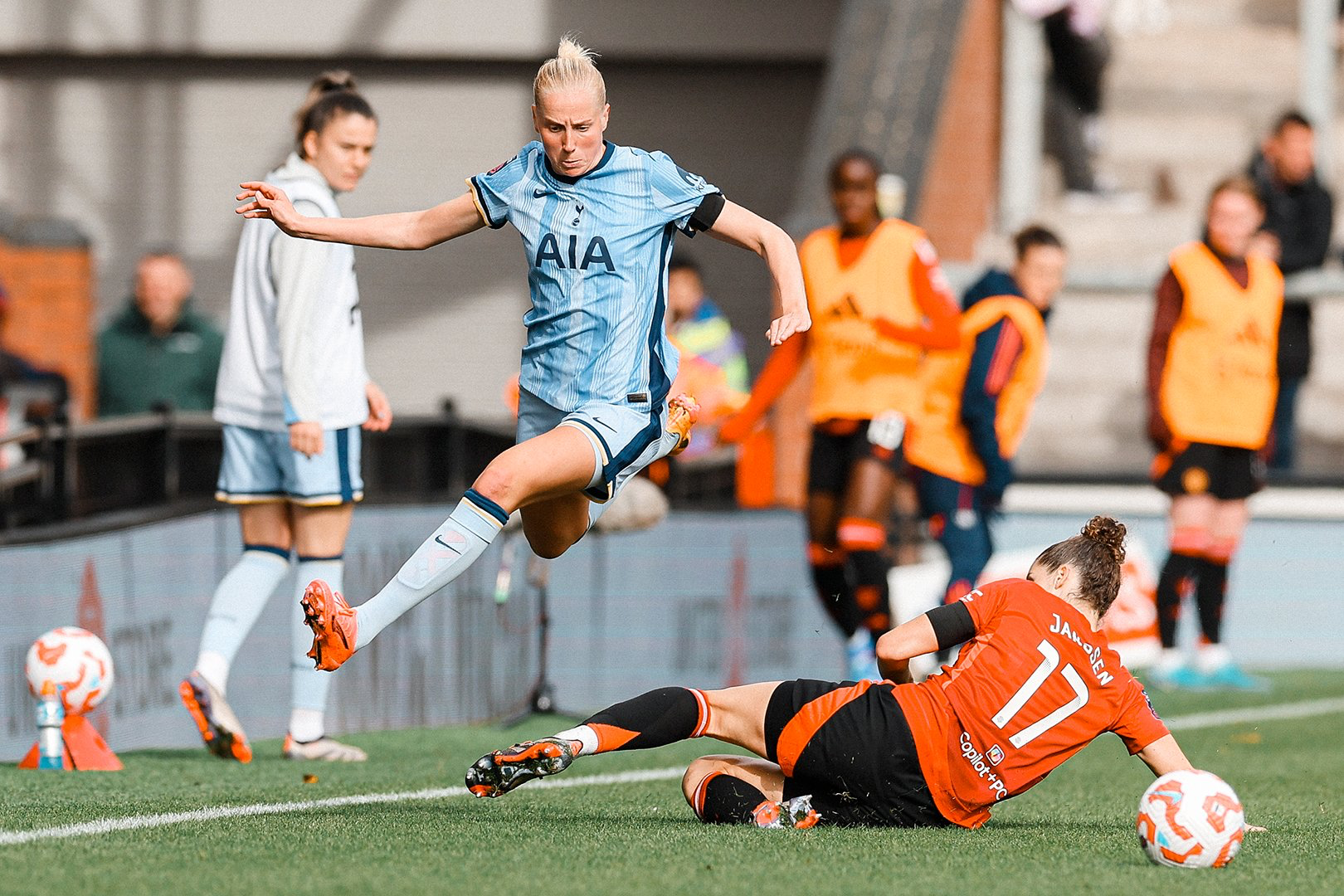
• Nobody reached double figures for goal contributions; last season, only Martha Thomas did.
•Clare Hunt led the team in total yellow cards with seven; Spence and Summanen were joint-second with five each.
• We ended the season with zero red cards!
• Every player who made a WSL matchday squad also made an appearance in league play, except for Araya Dennis, Jhanaie Pierre, and Erin Radbourne. Sophie Jackson was in an FA Cup matchday squad but also did not make an appearance.
• Of the players who made at least one appearance, only Amy James-Turner, Rosella Ayane, and Lenna Gunning-Williams didn’t make a start. James-Turner made a single appearance, and Ayane spent the first half of the season on loan at the Chicago Red Stars.
• Eight players made their WSL debut (Hunt, Oroz, Anna Csiki, Ella Morris, Kop, Olivia Holdt, and Josefine Rybrink) and four more made their Spurs debut (Hayley Raso had played in WSL previously, while Zara Bailey, Katelin Talbert, and Araya Dennis only appeared in the League Cup). Eleanor Heeps made her senior debut in the League Cup but featured in WSL and FA Cup play as well.
• Molly Bartrip was the only player to start all 22 league games and in fact played every minute. Naz and Thomas appeared in all 22 games but did not start all of them. Ashleigh Neville missed one game but had the second-most starts after Bartrip with 19.
• Neville made her 150th appearance for the club.
• Bartrip made her 100th appearance for the club.
In Focus
These are just a few topics that I thought deserved special mention or a fresh perspective.
• Tactics & team selection
The most frustrating aspect of this poor season was the seeming disappearance of the attacking identity that had been the hallmark of Robert Vilahamn's first season in charge. Did he simply abandon those tactics, or was it a matter of the new signings failing to adapt to them? I lean slightly towards the former theory, because the existing players from last year's squad looked just as lost.
Another big issue was players being utilized out of their best position. Perhaps Vilahamn was emboldened by the Angharad-at-rightback experiment from the prior season, but this year's attempts at shoehorning players into a newfound versatility were less successful. At a time when we weren't scoring nearly enough goals, watching Charli Grant forced to become a forward was downright painful to witness. The constant flip-flopping of Beth England and Martha Thomas in the forward line from last season also persisted, with equally underwhelming results. Then there was the special, opposite case of Ash Neville, whom Vilahamn stubbornly kept at her traditional fullback spot rather than releasing her to play on the wing, as she had done to great effect under Rehanne Skinner.
It would have been one thing if Vilahamn had been able to recognize how stale the attack had become and tried to mix things up with some players who had been languishing on the bench (Matilda Vinberg and Lenna Gunning-Williams come to mind), but he rarely made game-changing substitutions. And sticking with the same underperforming players in the defense did major damage at a critical stretch of the season. You could also argue that Eleanor Heeps deserved her chance to debut long before Becky Spencer's injury forced the matter. Hindsight is always 20/20, but I wonder if some of Vilahamn's starting lineup and substitution decisions would have been different if he could do it all over.
• Attendance
This is the elephant in the room every season. Regardless of how the team is doing on the pitch (and we have frustratingly followed a pattern of one good season, one down season ever since we reached the WSL), attendance remains basically stagnant, even with the move to a larger ground a few seasons back. The club seems to have decided that three is the magic number for games held at Spurs' main stadium and has only allowed for more in special circumstances (like the FA Cup semi-final last season, for example). Those matches at THS get all of the marketing effort, while the matches at our primary ground, Brisbane Road (also the home of Leyton Orient Men in League One), are treated as an afterthought. The attendance data backs this up:
- Average WSL attendance - 5,332
- Average WSL attendance without THS games included - 1,625
There's also a stark disparity between Spurs' WSL season high attendance (28,852 at THS vs Arsenal) and season low attendance (just 918 at Brisbane Road vs Everton). This is a great example of how even a small promotional push for the Brisbane Road games could make a difference; Everton fixtures are always hotly contested and tend to have narrow (often stoppage time-influenced!) results, but the club is seemingly incapable of framing any fixtures outside of our "rivalries" (I put that in quotes because they don't actually reflect the true rivalries for Spurs Women, but rather have been carelessly transposed from Spurs Men history) in their proper context.
Our highest attendance for a game at Brisbane Road was 2,206 vs Liverpool—less than a quarter of the ground's official capacity of 9,271. Again, this is a fixture that is much more competitive than the matches against top 4 sides that monopolized the THS games this season. But you wouldn't know that from Spurs' promotional strategy.
There's also a league-wide issue of clubs struggling to get fans excited about their WSL team if there isn't a regular England women's national team "Lioness" in the squad. We did see Jess Naz recently break through into the England team, but her call-ups have been inconsistent (she did not make the Euro squad this summer), and Ella Morris didn't get her first senior team call-up until this summer (and subsequently tore her ACL at that camp). Ash Neville's continual snubbing by England manager Sarina Wiegman is a longstanding point of contention, but it is what it is.
Clearly, Spurs have to find another angle—such as doing a better job of highlighting the other internationals in the squad (Eveliina Summanen in particular is hugely important to both her national team and Spurs) or boosting the up-and-coming talent like Morris (a moot point now, sadly), Gunning-Williams, or Heeps, two of whom are club-trained and already involved in the England youth setup.
Another route the club could have taken was to feature the cup games at Brisbane Road in light of our surprise journey to the FA Cup final the previous season. These games tend to be some of the worst in terms of attendance, but are often some of the most exciting—think of all of the last-minute goals that got us to Wembley in 2024. The League Cup group stage games don't have the knockout factor, but there is the possibility of a penalty shootout for an extra point in those that end in a draw.
There is reason to be optimistic that growing attendance for Spurs Women will be a bigger priority at the club this season with new CEO Vinai Venkatesham's arrival; he was instrumental in staging more WSL games at the Emirates in his time at Arsenal. Fingers crossed that we will see a similar commitment from him at Tottenham.
• Limited recruitment
One of the biggest topics this season was the limited scope of recruitment, with most players who joined having at least some connection to Robert Vilahamn, whether through playing for the team he previously coached (BK Häcken) or one of their Damallsvenskan opponents, or through sharing an agent. Our best new signing, Ella Morris, was a notable exception, with (now departed) assistant coach Vicky Jepson having scouted her during her time with the England youth setup.
It's long been apparent that Spurs are being outpaced by other clubs in the WSL in terms of transfer fees, but the scouting network deficiencies are the root issue holding us back from signing top talent. After Rehanne Skinner was sacked, we seemingly lost any ability to scout in the NWSL—though even then we were mainly drawing from connections with the Orlando Pride. It's a known fact that there is no head of recruitment for Spurs Women (yet), and the task primarily falls to the manager.
Simply put, the team's scouting infrastructure needs a massive overhaul if we're ever going to close the gap with the top teams. Investment is needed in a literal sense for signing players, but also for support staff to make those signing decisions. Not only will having dedicated scouts improve the caliber of players we're bringing in, but it will also free up the manager to focus on actually managing the team.
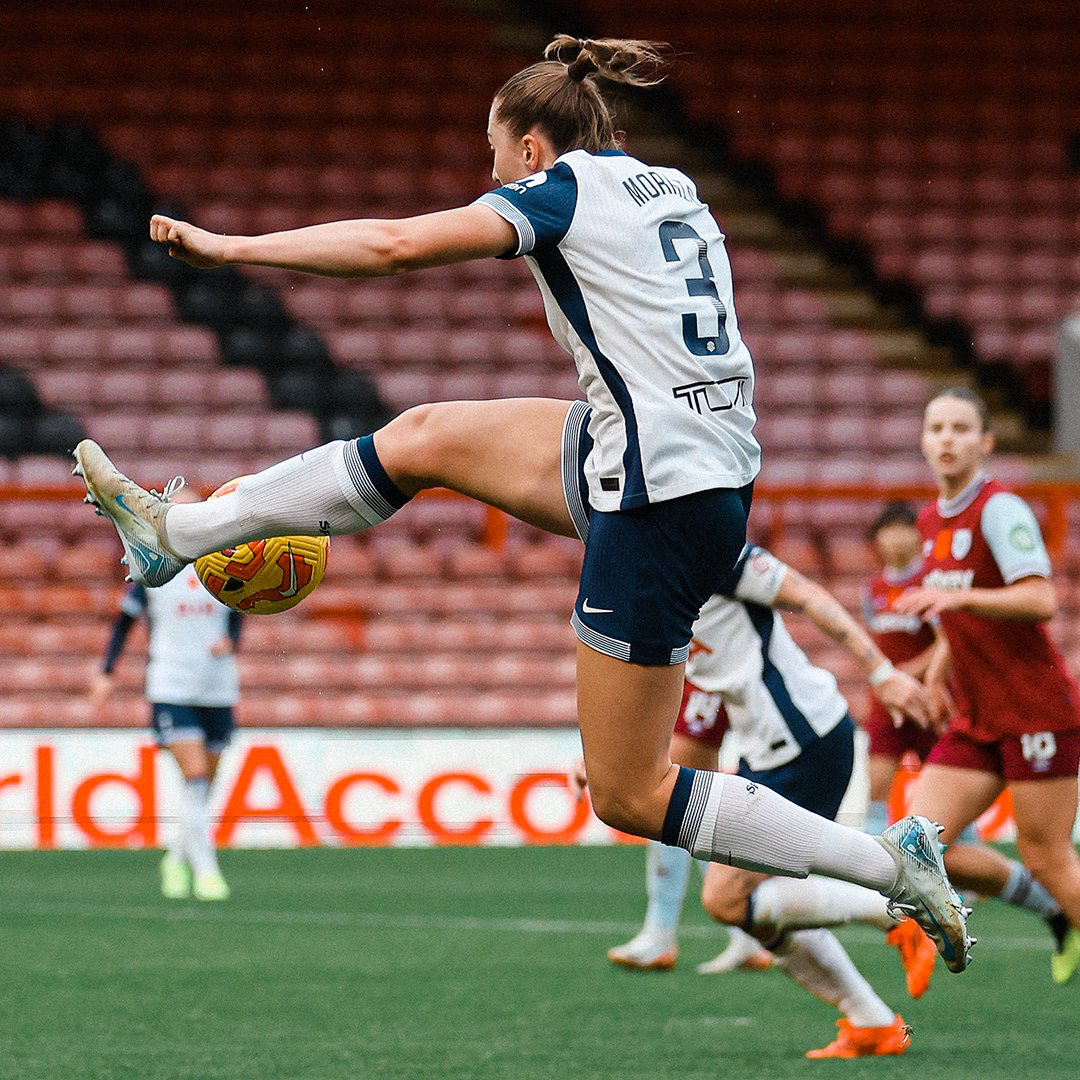
First Goal Inductees 🎉
Players who scored their first goal for Spurs, in any competition:
• Hayley Raso
• Luana Bühler
• Clare Hunt
• Araya Dennis
• Olivia Holdt
• Ella Morris
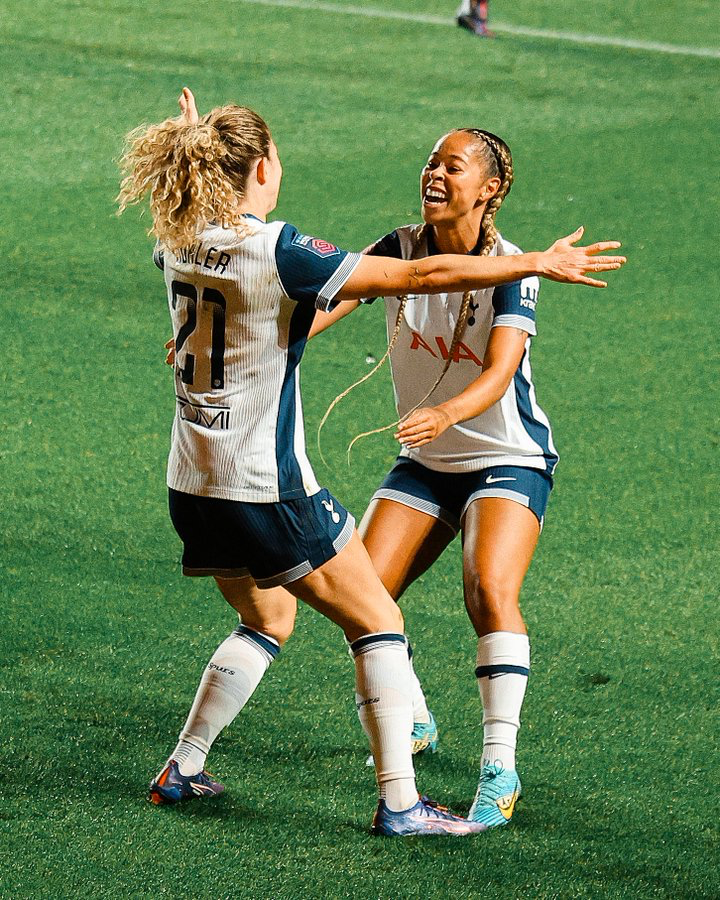
Best Moments
• Jess Naz's late winner in the League Cup against Charlton
• Luana Bühler (finally) getting her first Spurs goal
• Katelin Talbert's Cruyff turn in her own box
• Eleanor Heeps' debut clean sheet
• Eveliina Summanen's game-winning golazo in the League Cup
• Araya Dennis scoring her first senior goal in her second match
• Olivia Holdt's free kick goal on her club debut
• Ash Neville's goal-line clearance against Arsenal—that may or may not have been legit
• Ella Morris opening her account with Spurs with a fantastic solo effort
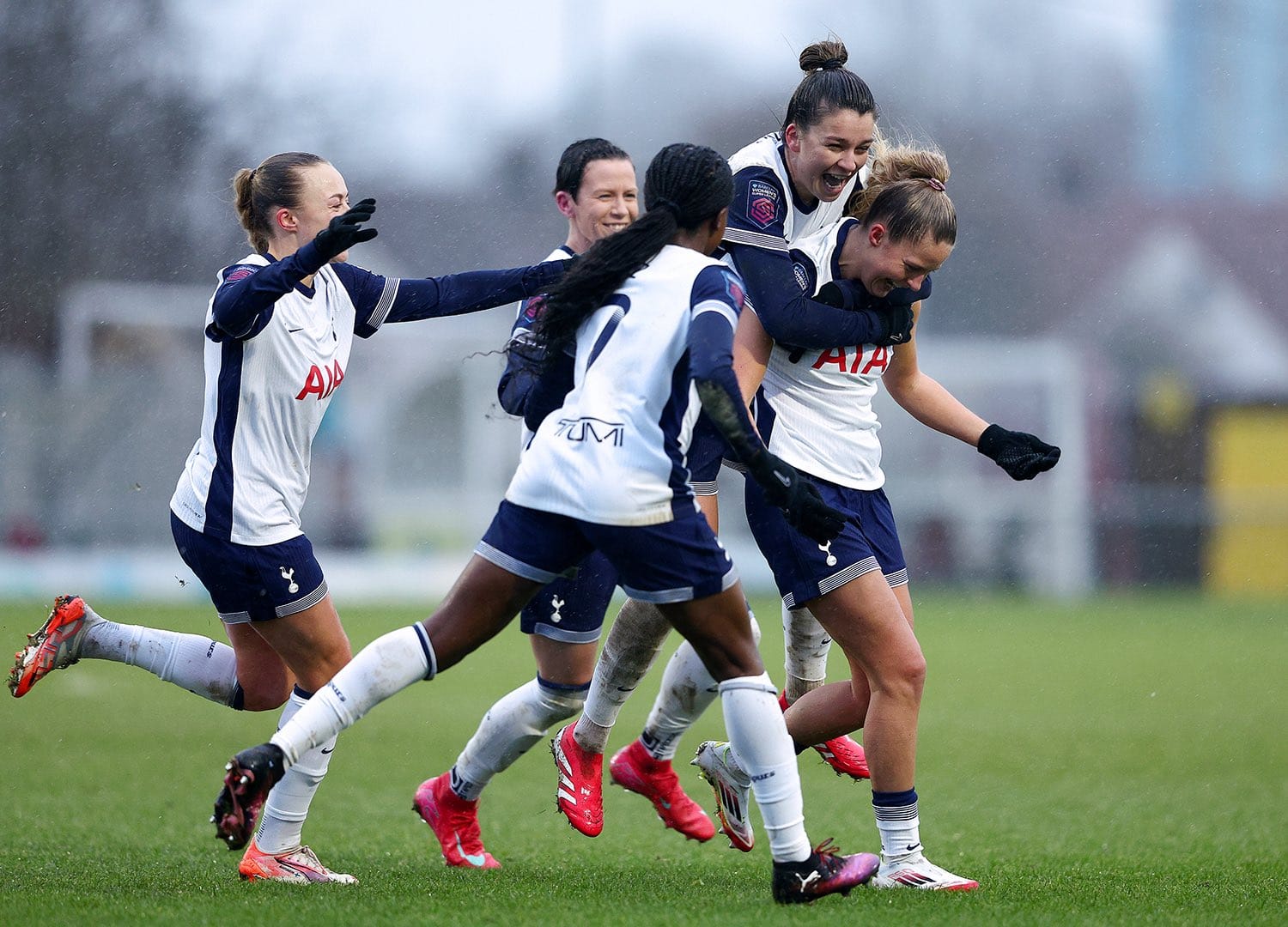
Worst Moments
• Conceding a penalty in stoppage time to lose to Liverpool
• A rerun of the Bunny Shaw hat trick experience
• Failing to score in the NLD loss at Tottenham Hotspur Stadium
• Learning about Becky Spencer's loan to Chelsea
• Getting knocked out of the League Cup by rivals West Ham
• ...and then the FA Cup by tricky Everton
• The winless streak to end the season
• Ella Morris tearing her ACL at England camp pre-Euros
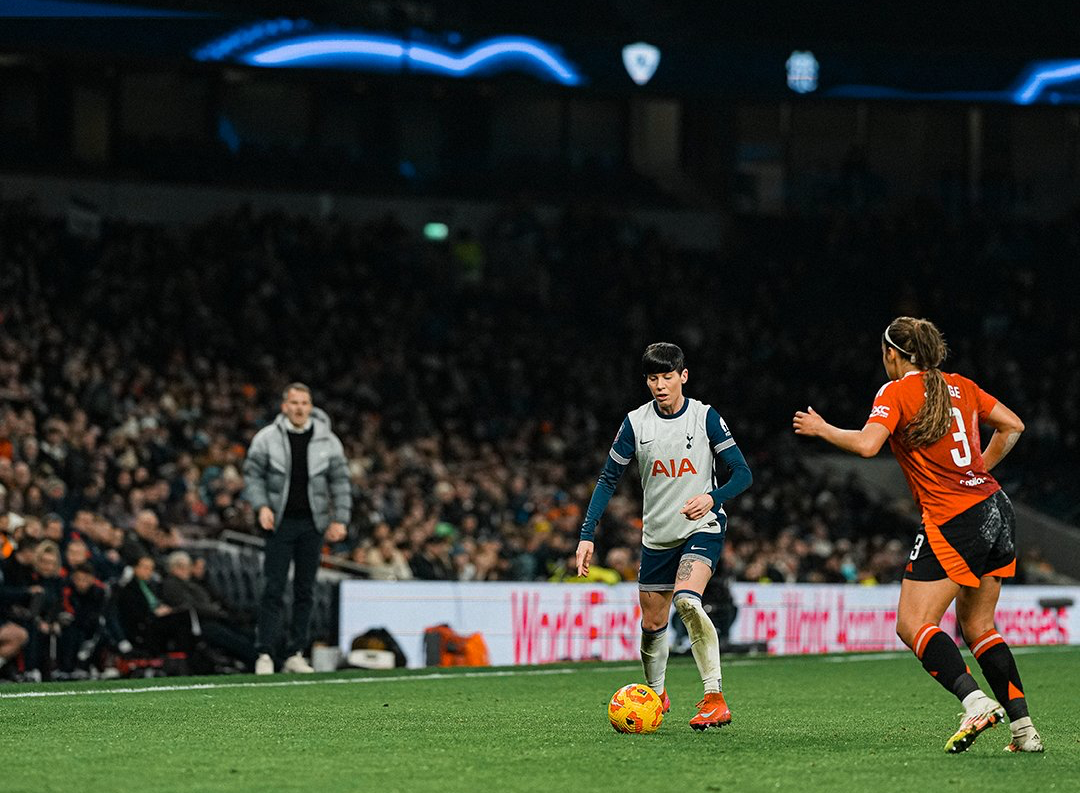
Player Superlatives
Same caveats as with the Men's team superlatives: I chose a different player for every category, and the best young player award is for a player 21 years old or younger.
Biggest surprise: Lize Kop
Best new signing: Ella Morris
Best young player: Eleanor Heeps
Most valuable player: Bethany England
Most improved player: Eveliina Summanen
Ms. Tottenham: Molly Bartrip
Player of the Season
Drumroll please...
The nominees are:
✴︎ Drew Spence
✴︎ Ella Morris
✴︎ Beth England
And the winner is:
Eveliina Summanen!
While it's true that we were heavily reliant on England for goals and, by technical definition, that makes her our most valuable player, I think Summanen was the most integral player to the team overall. We certainly played worse when she was injured mid-season. She improved her defense this season as well, which I can't say about most of the squad. Her leadership was also important.
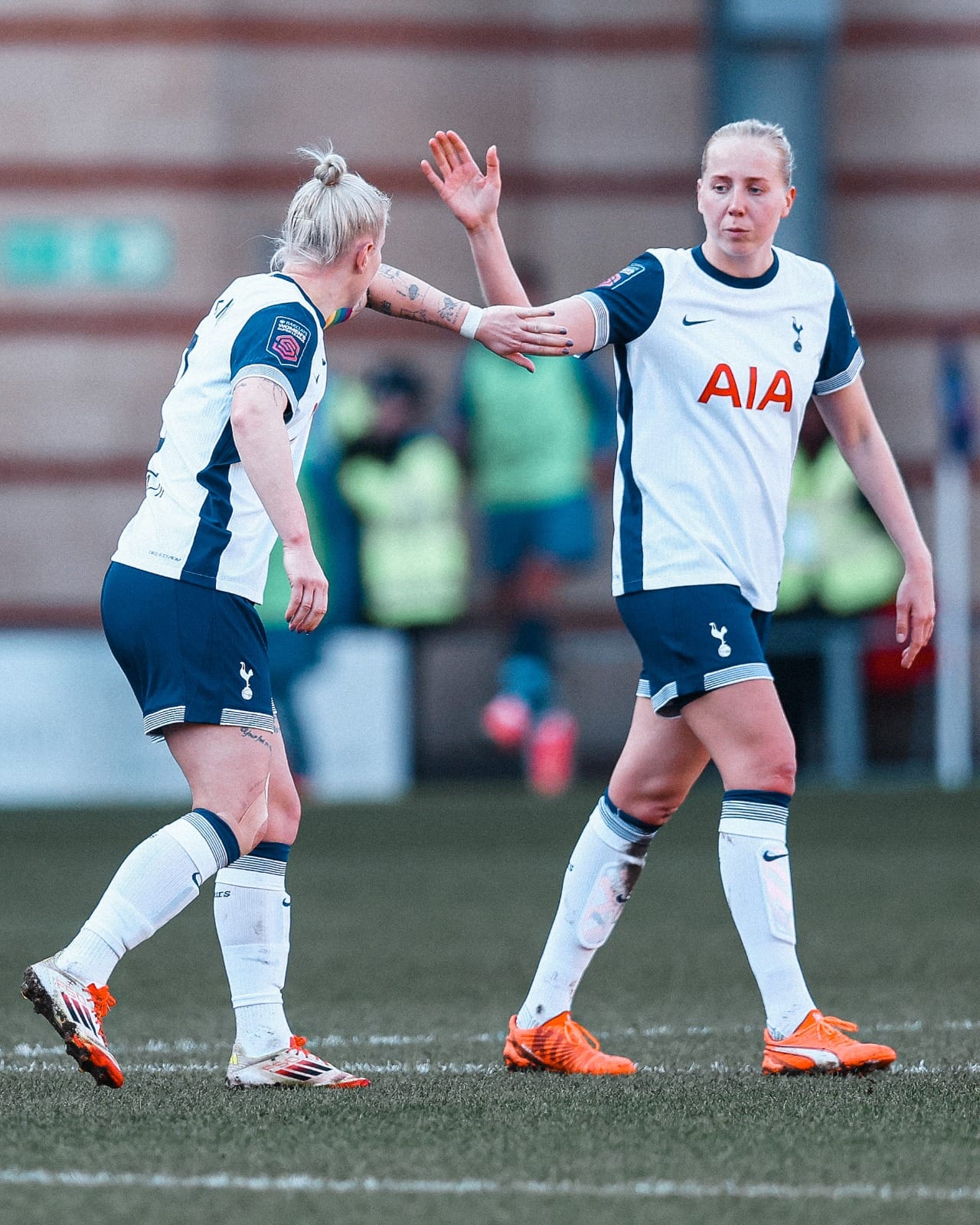
Summanen had the clear highlight of the season, a long-range goal to beat Aston Villa in the League Cup. In a season where there wasn't much daring to do, she did it.
Season rating out of 10: 4
This rating could easily have been lower, but I bumped it up slightly to account for the fact that we did not, in fact, get relegated (phew), and also for the superb signing of Ella Morris, who promises to be a huge talent in the seasons to come. Otherwise, we have to be honest about the fact that we saw many players not only fail to progress, but actively regress, as did the team as a whole. The table finish of 11th place was unacceptable for a club with such lofty stated ambitions as Spurs had claimed for Robert Vilahamn's project.
Questions and concerns:
• How do we bridge the gap with the top teams?
Scratch that, because it's the wrong question—or at least premature. We're going to need a "back to basics" approach to begin the season, unfortunately, because the rebuild has been set back. But we also need to see some indicators that any improvements made (to the squad, especially) can be sustainable and allow the team to break out of this constant cycle of yo-yoing back and forth between mid-table and relegation-threatened seasons. If we are going to reach the next level, the club needs to prioritize three things:
- Locking down the best players (particularly young talents) to longer contracts to avoid situations like Celin Bizet's unexpected departure, and even the loss of a promising Academy player in Persis Oteng
- Diversifying the recruitment pool while increasing transfer spend to improve the ceiling of the squad
- Growing and energizing the fanbase to boost the profile of Spurs Women relative to other WSL challengers
The sad truth is that the seasons where we came close to broaching the top of the table were largely down to individual player overperformance rather than the overall team being set up for success. It's notable that our biggest achievement so far was reaching the FA Cup final, since the nature of going on a cup run is taking games one at a time. It's much more difficult to string together an entire league season of results. Finding that game-to-game consistency will be key going forward.
As for the newly announced manager, Martin Ho, that goal of consistency will require him to focus on developing the entire squad, not just relying on a few talismanic players to overcompensate for their teammates. We saw glimpses of the team working towards a distinct tactical vision at times in Robert Vilahamn's first season, but the identity was not as strong as we had hoped. We need to implement a clear style of play and for players to be able to come in and out of the lineup on any given matchday without seeing a drop-off in that style.
The fanbase element cannot be overlooked. One of the reasons that teams like Chelsea and Arsenal, not to mention Manchester United (who reached the top flight the exact same season as Spurs), are able to sign the best players in the global transfer pool is that there is a tangible excitement around those clubs and the trajectory they are on. Having lively fan support and respectable attendance figures is part of that, and it will be difficult for Spurs Women to attract top players as long as the team continues to carry the perception of being largely ignored by the wider Spurs fanbase (and often the club itself, at times).
• What will the defense look like this season?
Now that I've addressed the big picture, let's get granular. There's likely going to be a significant shakeup in the defensive line this season—which is needed, quite frankly. This area of the squad consistently underperformed last season, even as individual players had the occasional standout moment.
One area where our defenders have shown actual skill is in contributing to the attack, but when it comes to the bread-and-butter of their positional responsibilities, we've definitely been lacking. A shift to a back-three could be one potential way to get the most out of players like Ash Neville and Amanda Nildén by converting them to wingbacks, but we don't currently have a strong enough roster of centerbacks to make that a realistic strategy.
Unfortunately, Ella Morris' offseason injury is going to be one of the biggest factors in shaking up the defensive lineup. She would have been a locked-on starter if I were picking the teamsheet, but now she'll need to be replaced until at least the last few weeks of the season, if she is able to make it back to play in 2025/26 at all. So, even as I would like to see Neville empowered to move into the attack in a more meaningful way, she will likely be needed at fullback again this season, barring a quality signing for the rightback position. However, that then leaves us with just Nildén and Charli Grant (who has underwhelmed) for the leftback role, unless Academy product Zara Bailey is able to make an unexpected leap into playing with the senior team fulltime (she made her debut last season in the League Cup and didn't look out of place, but that was against now-relegated Crystal Palace).
And as I alluded to above, the slate of centerbacks is less than reassuring. It was a relief to see Molly Bartrip renew her contract with the club, since she has been far and away our most consistent central defender, not to mention her contribution as co-captain of the team. But my preferred partner for her in the CB duo, Luana Bühler, continues to struggle with injuries—so much so that she was called up to the Switzerland squad for her home Euros after rehabbing an injury late in the season at Tottenham, but had to be withdrawn before the tournament began. Clare Hunt had an uneven first season at the club but could still come good, while Josefine Rybrink did little to hint at what assets she could provide the team since joining in January. Amy James-Turner seems to be dealing with a private issue, only making a single appearance last season and potentially moving on this summer. I don't want to talk too much about our latest signing, Tōko Koga, since I'll get into it in the next general issue, but suffice it to say that it would be foolish to fully rely on a 19-year-old to solve our defensive woes, however exciting a prospect she is.
In other words, it doesn't feel like this contingent of the squad is quite complete yet, but there's still plenty of time left in the transfer window to make the necessary changes. When thinking of the profile of player we need to target, I think aerial ability and one-on-one defending skills should be paramount. We already have some decent crossers in our fullback options, and Bartrip is a calm presence in playing out from the central defense, with a capacity for line-splitting long passes as well. Again, it's the defensive nuts and bolts we need to add to the equation.
• What are the realistic goals for next season?
I'm going to try to be optimistic in light of the recent manager appointment—which by all accounts is quite a coup in the tactical sense—but also realistic. A return to a clearly defined and executed playing style would be a huge improvement over last season's lackadaisical approach, but since we are not starting from a position of strength, we cannot expect miracles. So don't even think such lofty thoughts as challenging for a Champions League qualification spot. As recent history has shown, though, a cup run is never out of the question if we pick up the right momentum.
That being said, I don't think we will have to worry too much about falling into the relegation playoff spot, which is a new scenario with the league expansion changes for this season. The threat of outright relegation is off the table. We will still need to be vigilant to the challenge that WSL newcomers London City Lionesses represent with their ambitious ownership (hello, Michele Kang!) and a squad that is already close to WSL level before they've even played their first game in the top flight. It's not just LCL who are pushing the envelope, however, and it's never been more true that Spurs cannot afford to stand still. We'll only know just how serious the club is about allowing Spurs Women to properly compete this season after the transfer window has shut.
And now to send off the Women's team with a celebratory photo gallery!
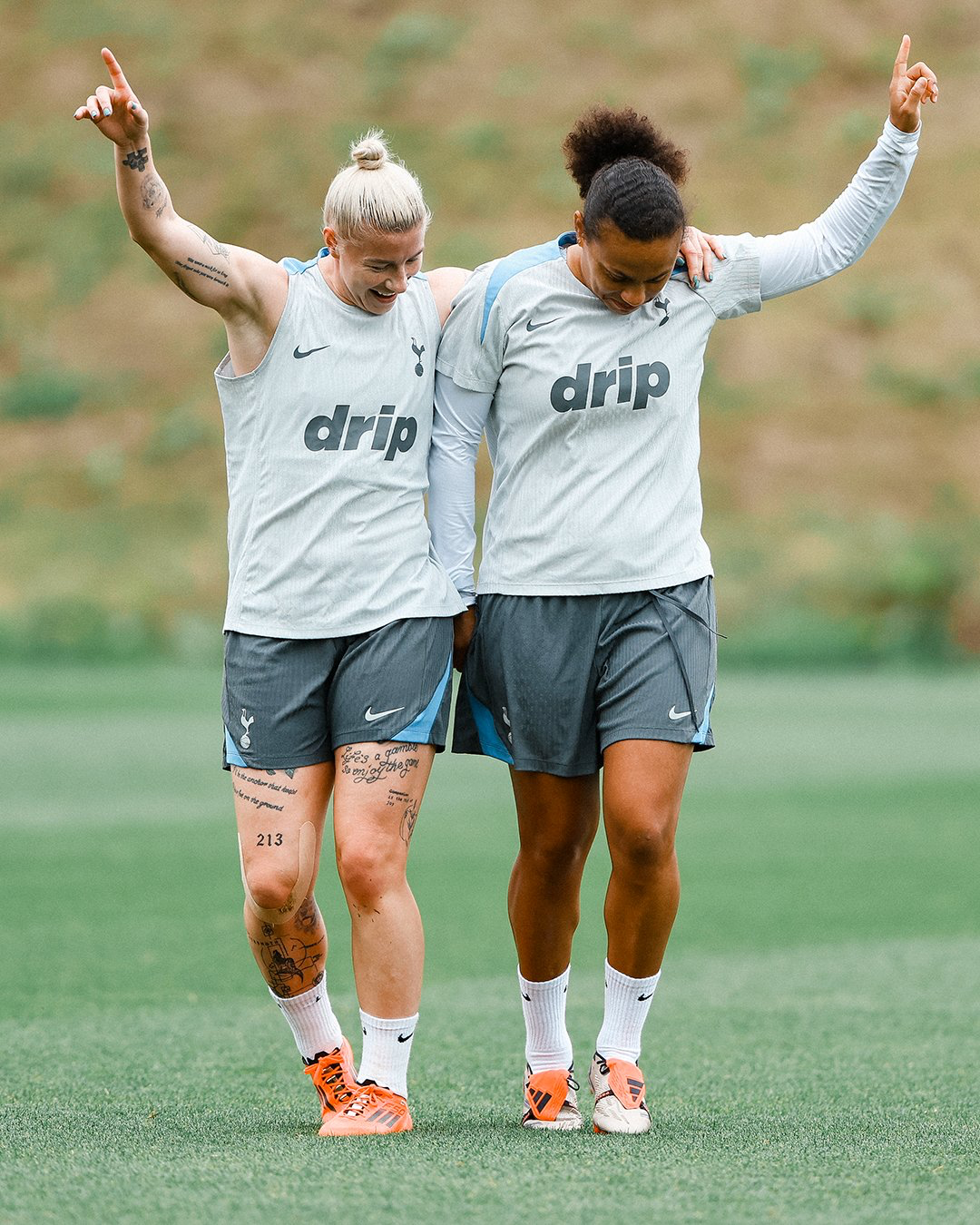
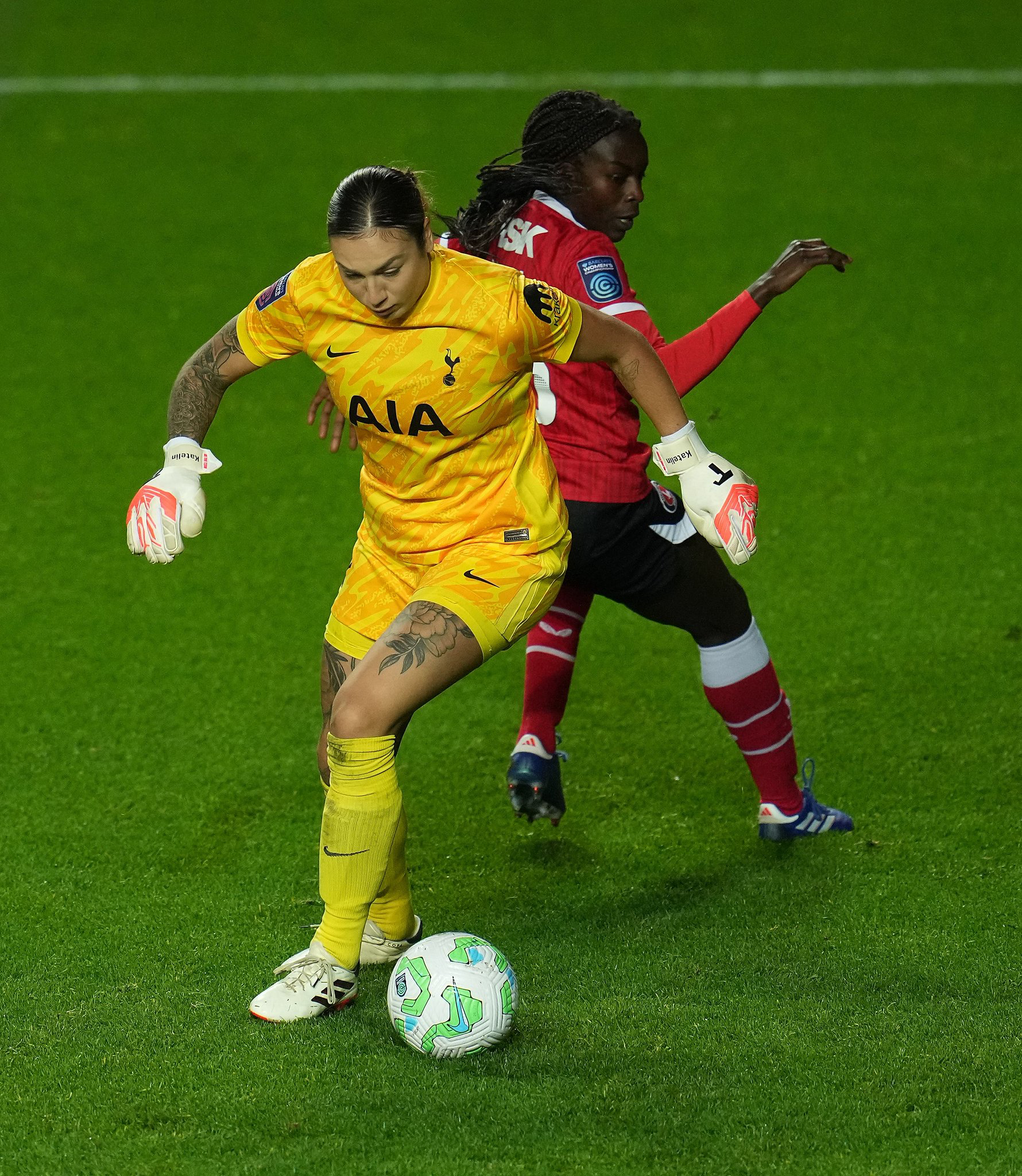
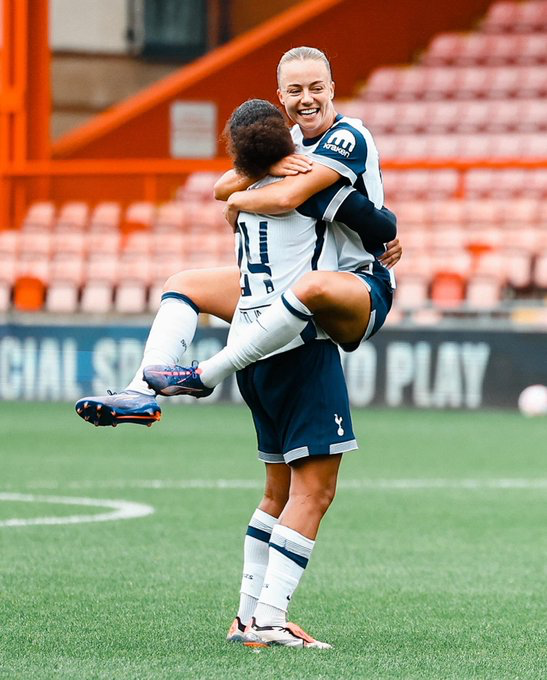
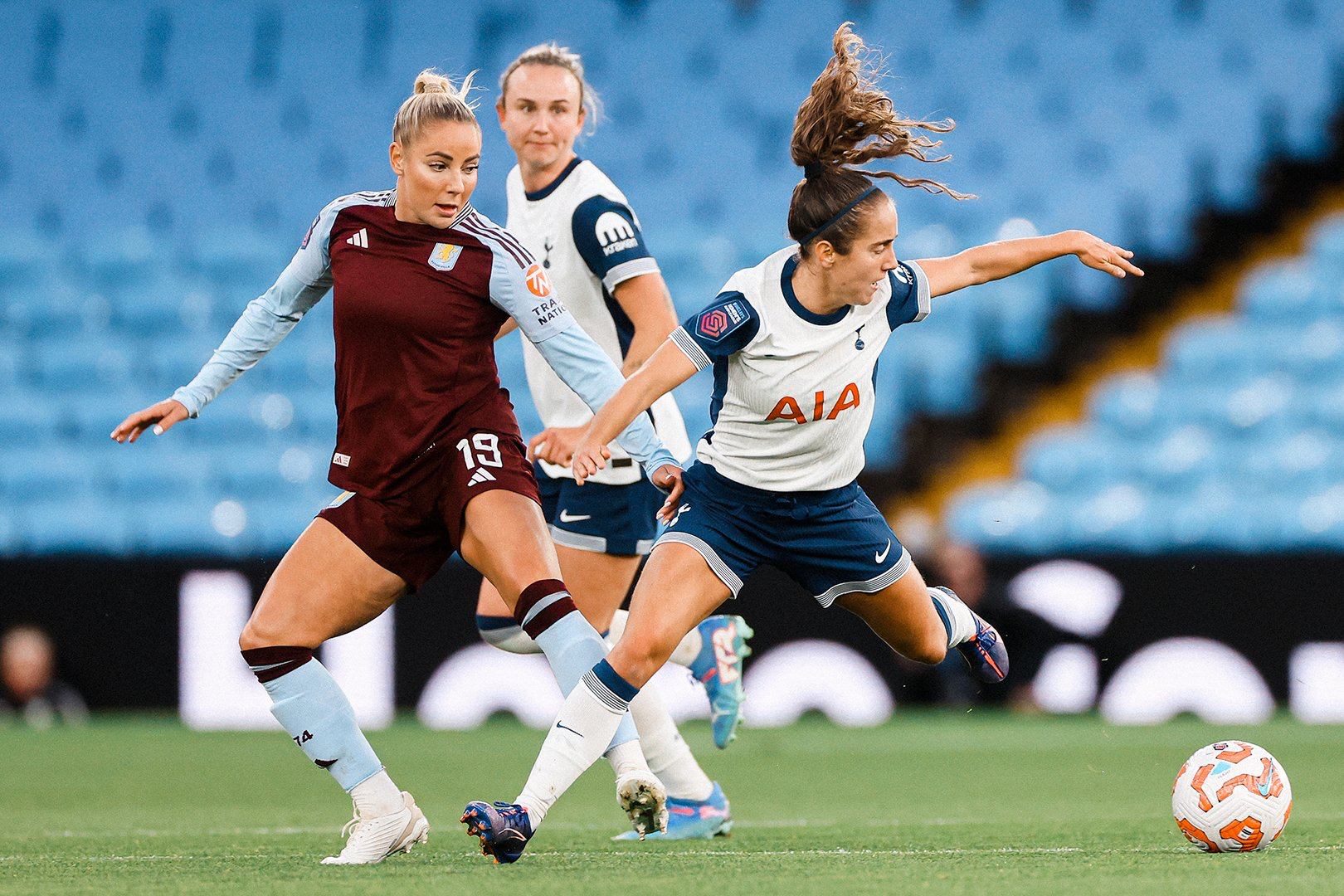
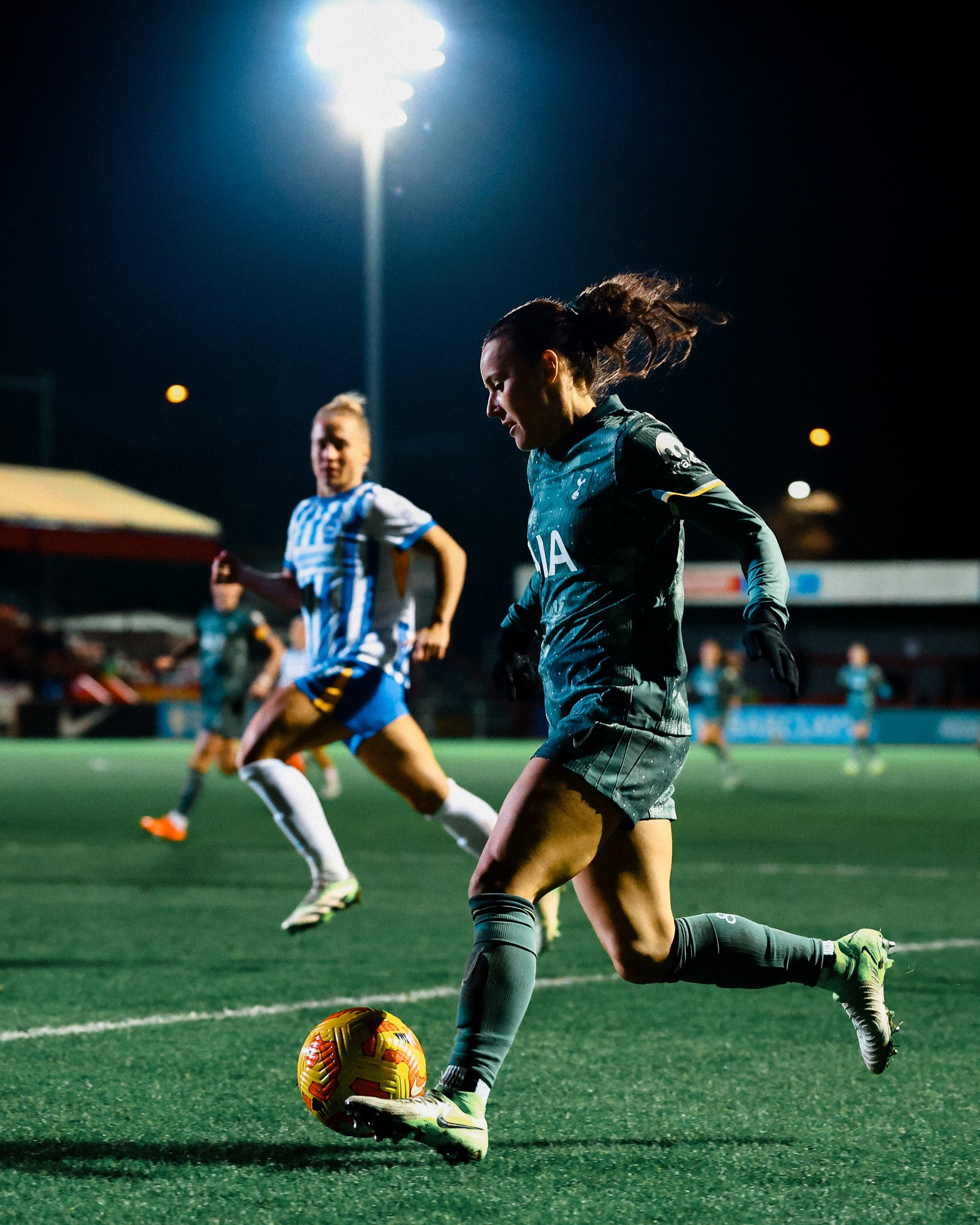
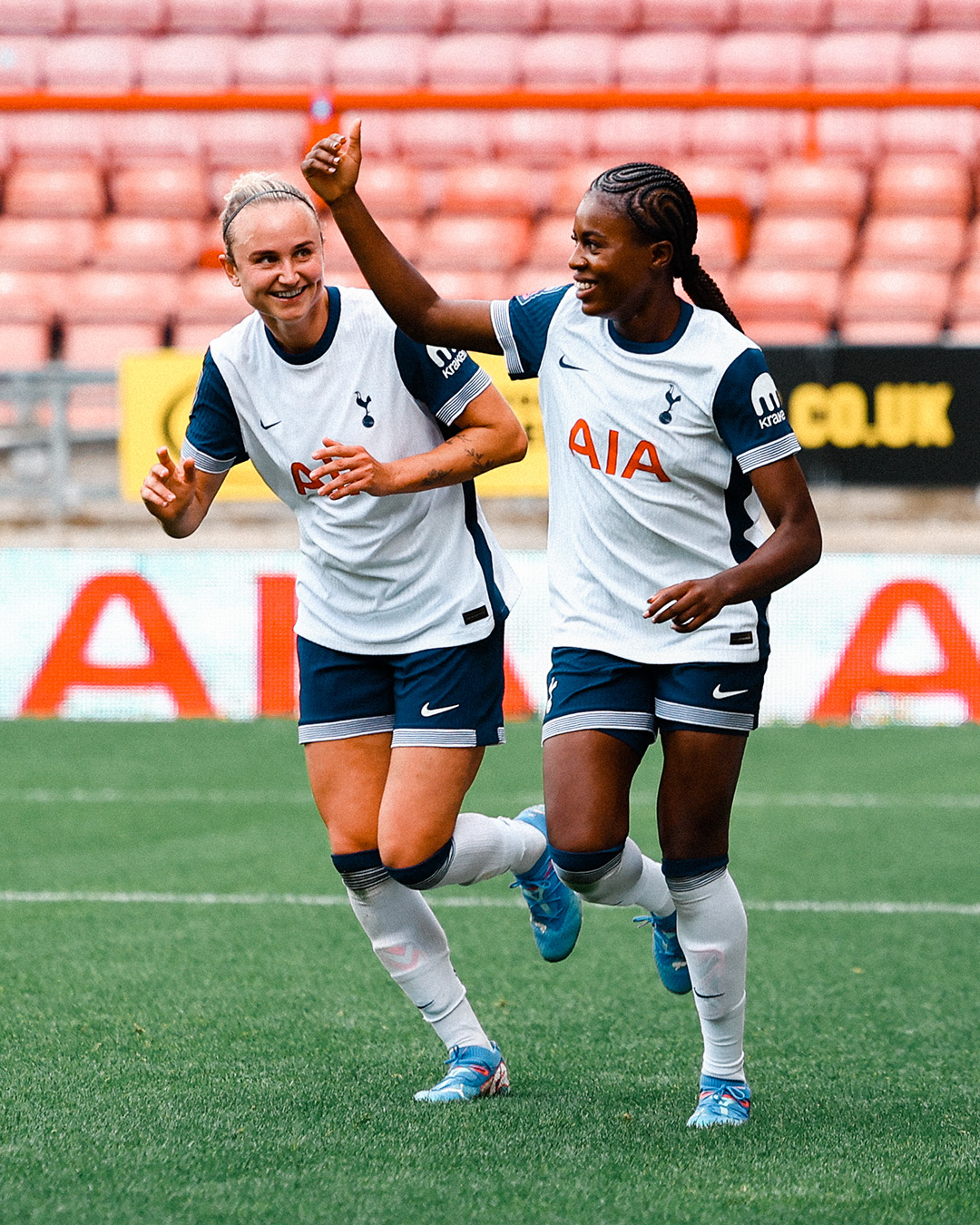
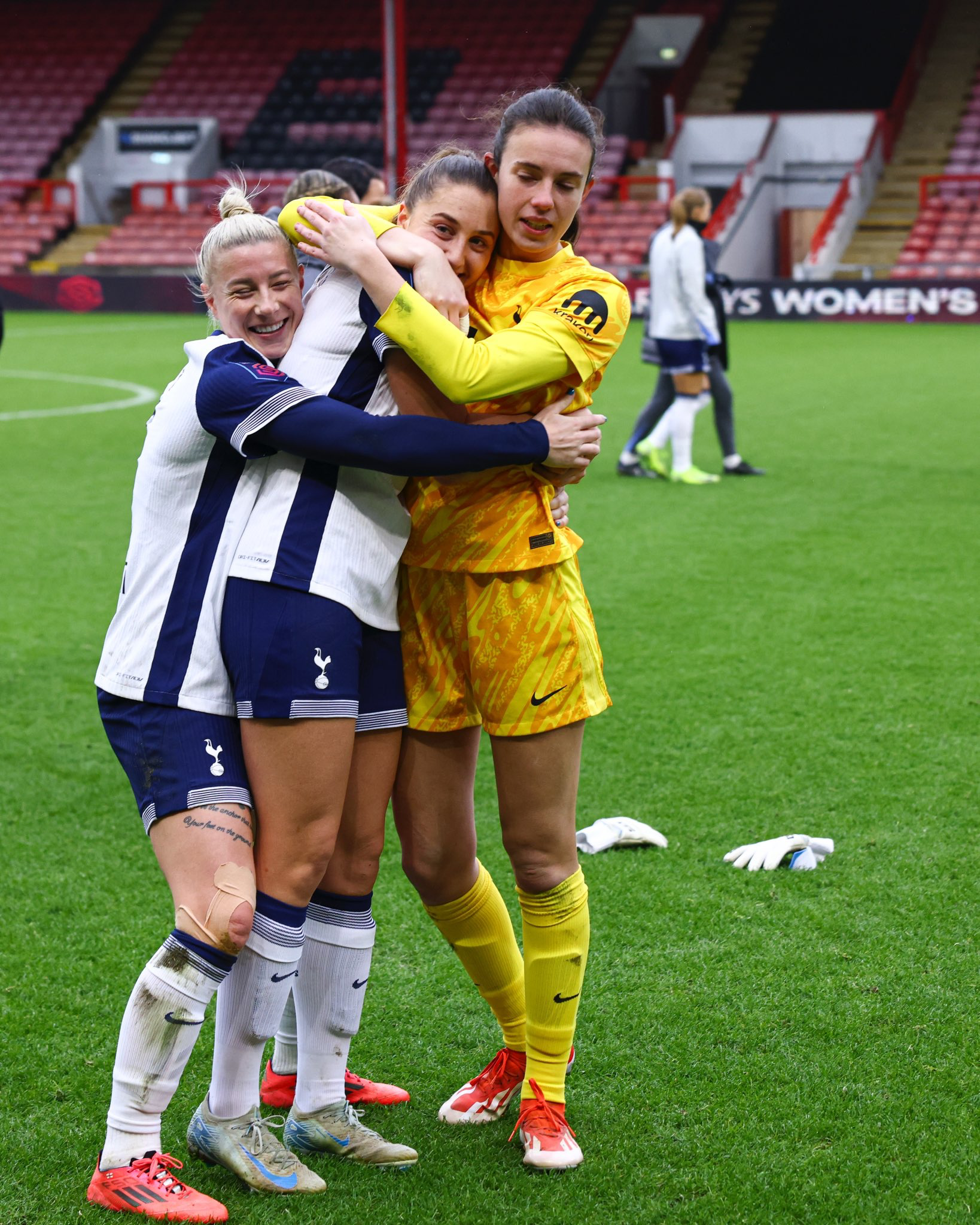
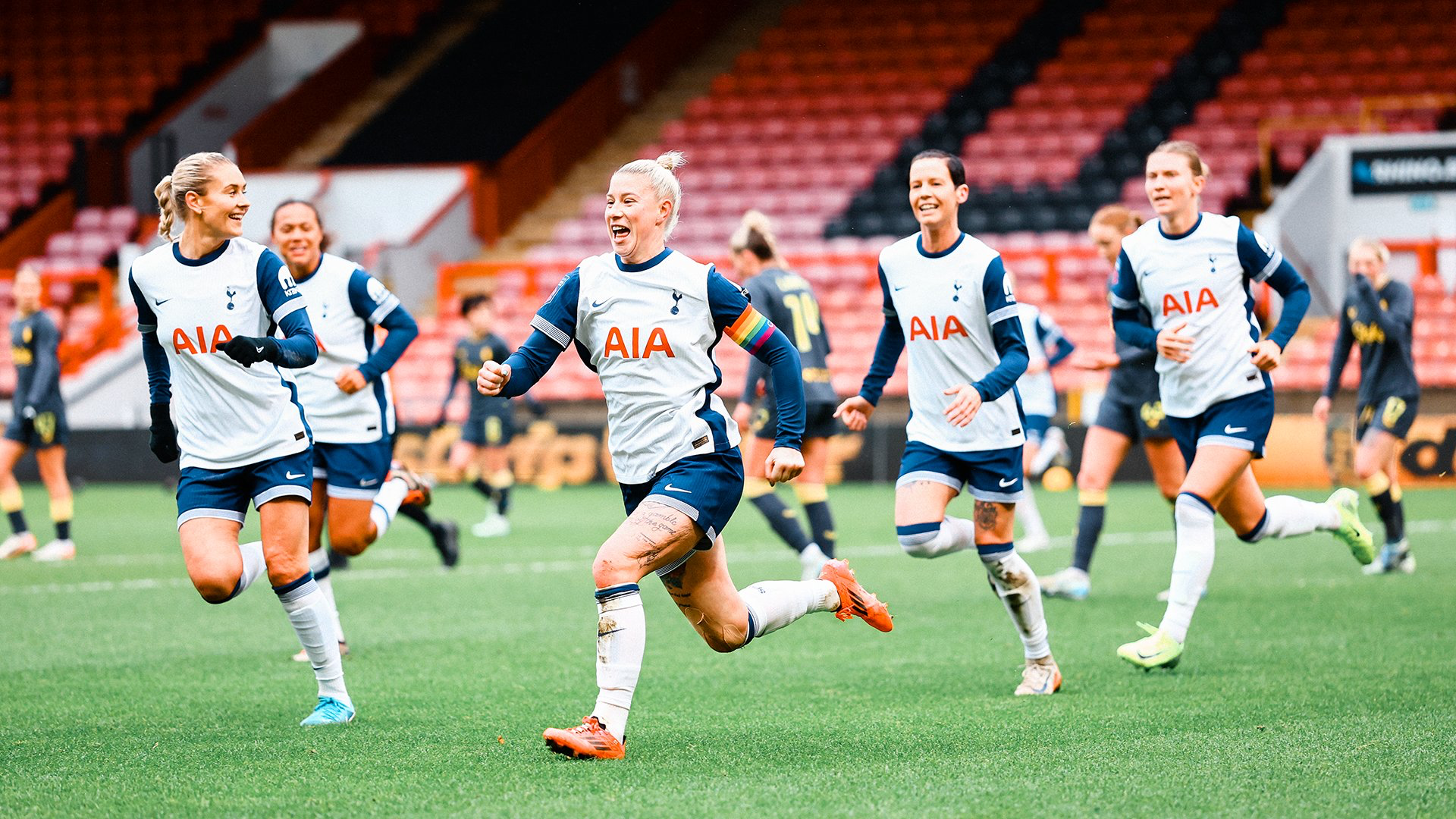
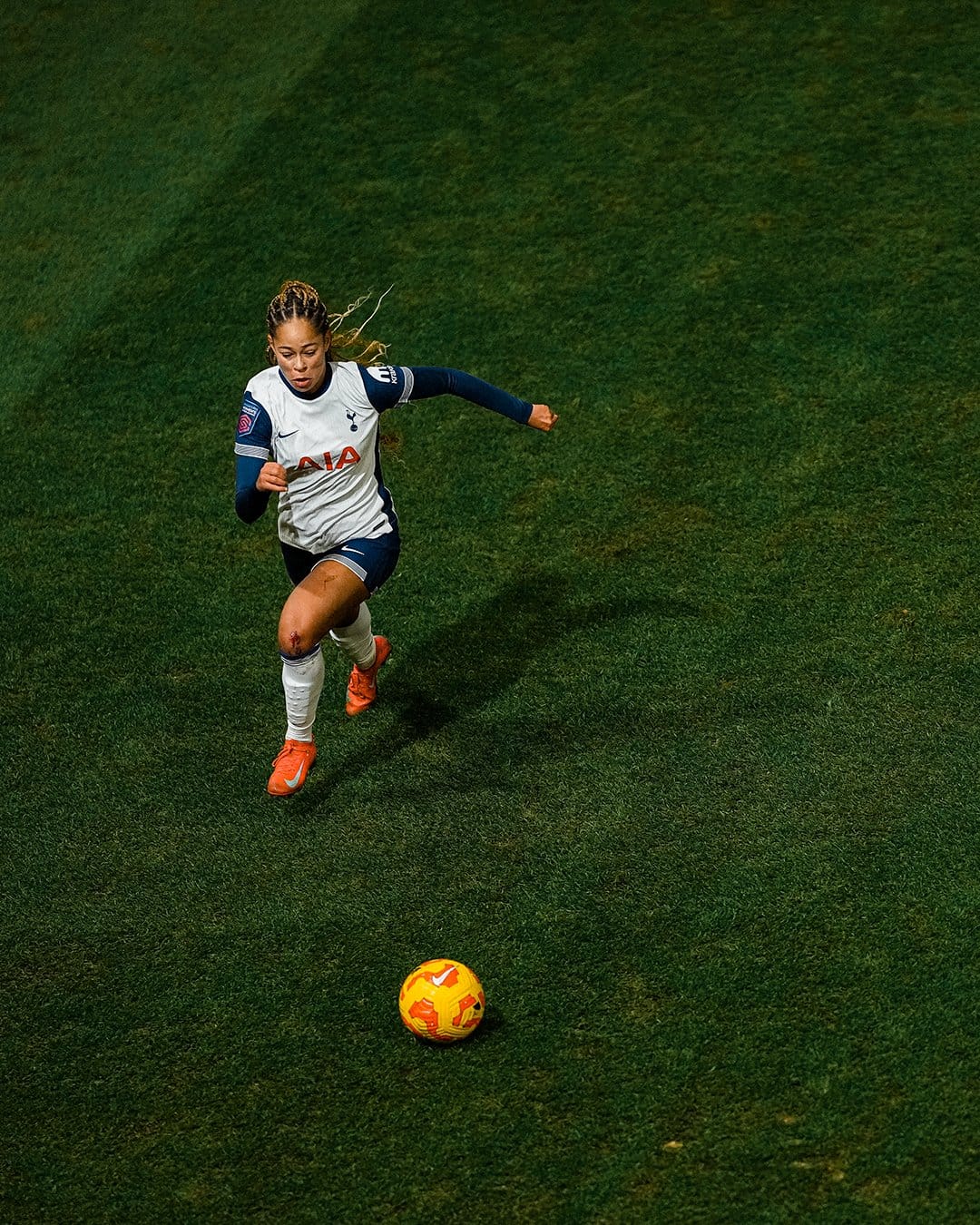
Here's to a rebound in 2025/26 under the new manager!
Academy Teams 2024/25
I'm not going to go super into depth on the Academy teams, but it was nice that we finally started to get information on the Women's Academy this season, so why not at least round up the highlights? I'll also include a section for notable Academy loans.
Men's Academy
• Senior debuts for Callum Olusesi, Damola Ajayi, and Will Lankshear, with several others involved in PL and cup matchday squads
• U17s won the U17 PL Cup
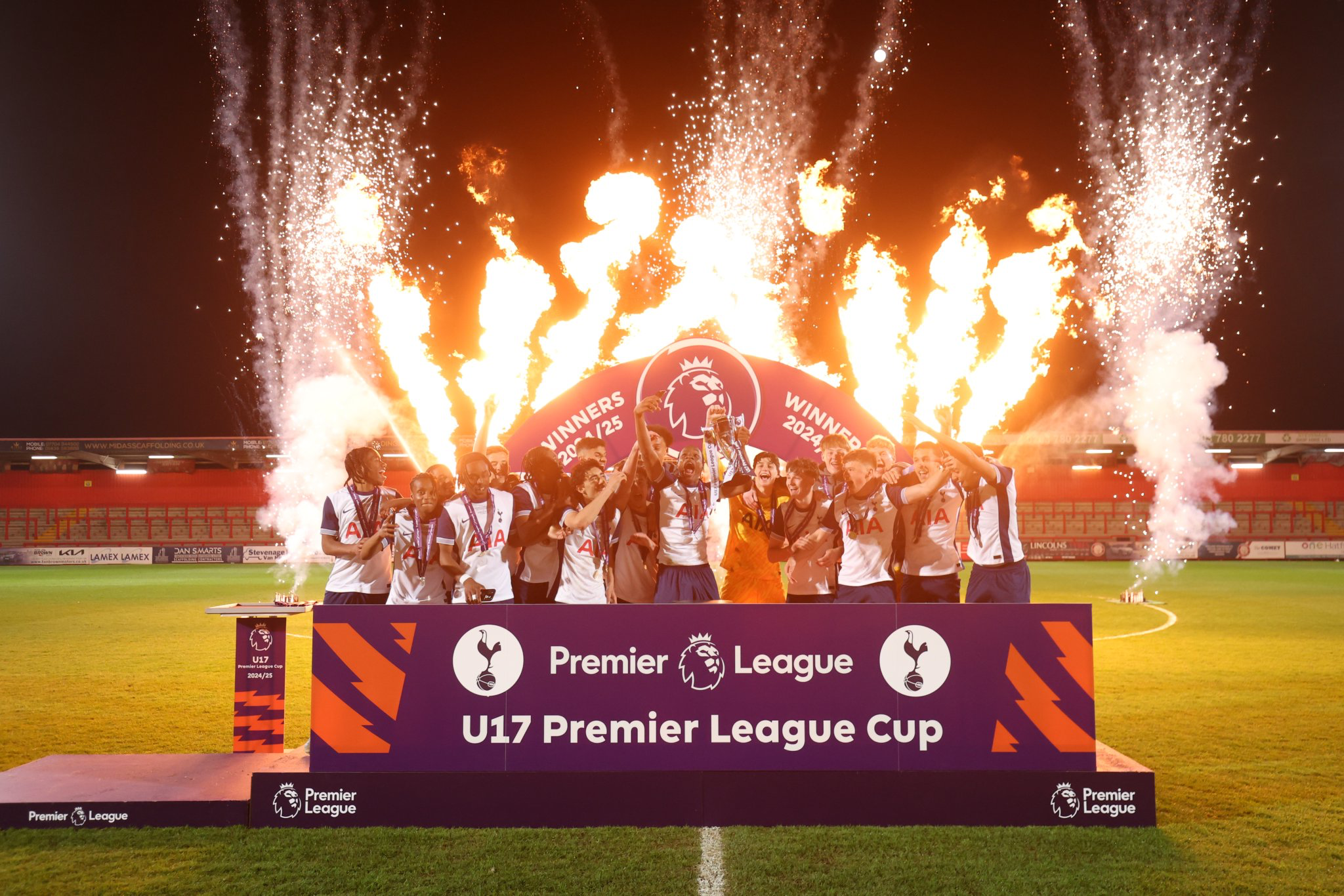
Women's Academy
• Senior debuts for Zara Bailey, Araya Dennis, and Eleanor Heeps, with several other players involved in WSL and cup matchday squads
• U16s won the PGA Champions trophy
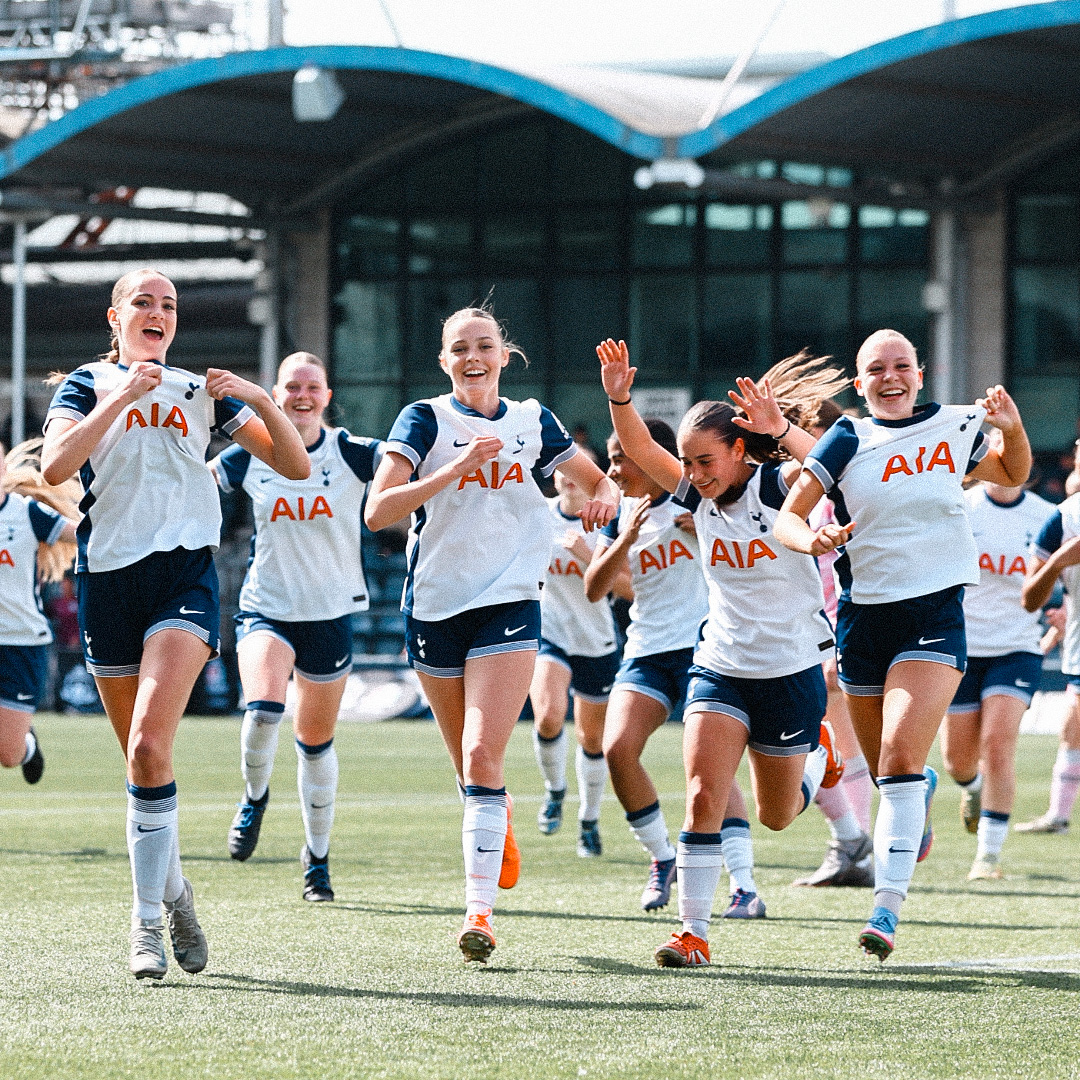
Loan players
• George Abbott played at Notts County in League Two, helping them reach the promotion playoffs (knocked out in the semi-final by AFC Wimbledon).
• Josh Keeley and Jamie Donley both played at League One side Leyton Orient, helping them reach the promotion final (losing out to Charlton Athletic) and the 4th round of the FA Cup (knocked out by Manchester City). Keeley memorably scored a stoppage-time equalizer in the 2nd round of the FA Cup, and Donley led Leyton Orient in assists in League One play.
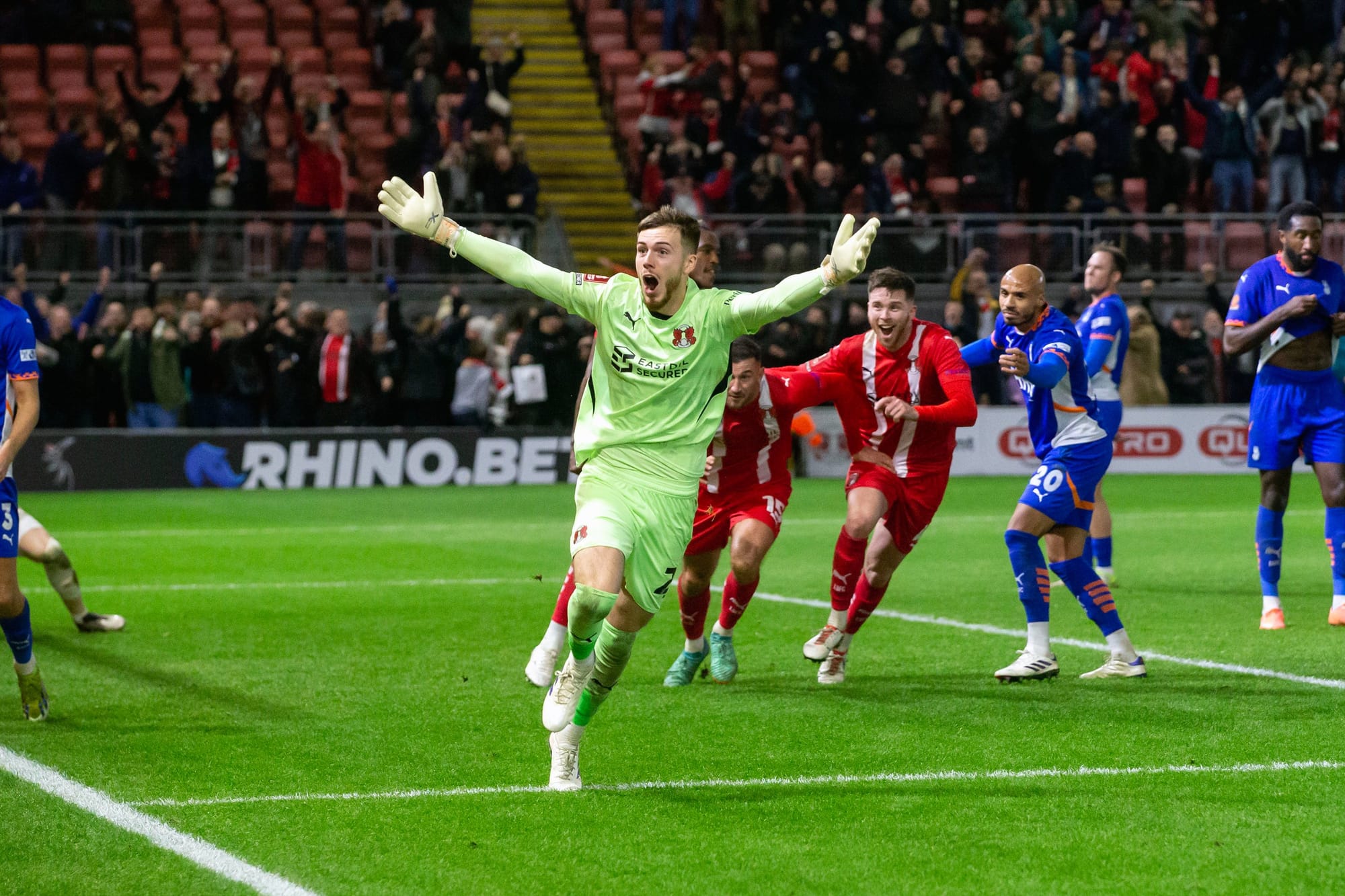
• Alfie Dorrington played at Aberdeen in the Scottish Premiership, winning the Scottish Cup and earning a berth in the Europa League qualifying phase.
• Will Lankshear completed a loan at West Bromwich Albion after spending the first half of the season with Spurs Men's senior team, having featured in the Europa League and Premier League.
• Alfie Devine played at Westerlo in the Belgian Pro League alongside Luka Vušković, who will join up with Spurs this summer.
• Araya Dennis played at Southampton in the Championship after spending the first half of the season with Spurs Women's senior team, having made her debut in the League Cup.
Spurs Across the Offseason
I have quite a lot of news to catch up on in the next regular issue, but will continue to post infrequently until the pre-season begins in earnest.
Otherwise, you can also find me podcasting at The Tottenham Depot and N17 Women.
And as ever, thank you for reading my newsletter! I appreciate everyone who's subscribed and everyone who's helped me keep it running with a tip on Ko-fi—your support is very much appreciated.
COYS

Thank you for reading!
If you’re enjoying the newsletter, make sure to sign up for a free subscription to receive new issues in your inbox, or upgrade to a paid membership to unlock additional bonus content every month. You can also buy me a Ko-fi for a one-time tip. Your support keeps Spurs Across the Pond running and is much appreciated.
You can also find me on Twitter and podcasting at N17 Women and The Tottenham Depot.
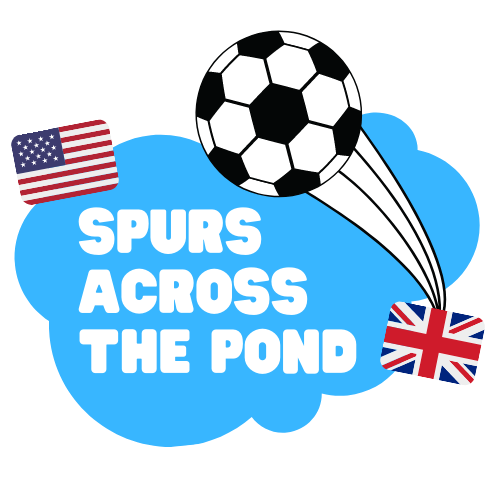
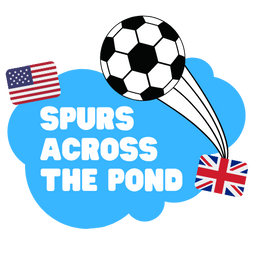
Member discussion